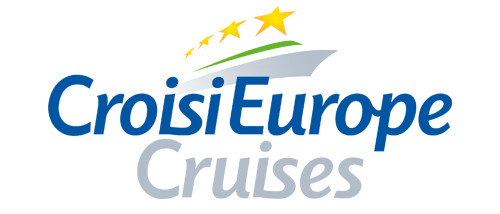- Home
Central Europe
Excursions in Central Europe
Journey to the centre of Europe along the beautiful Blue Danube, wander through many countries rich in cultures and traditions and discover the many remarkable places from Austria to the Black Sea.
Our cruises on the Danube can offer you an adventure of some of the most beautiful capitals of Europe, such as; Vienna, royal city and pearl for music lovers or Budapest, the magnificent Hungarian capital.. You will follow the Danube and see how this legendary river has shaped history. See Bucharest, the Romanian capital, and spend a whole day tracing the steps of Dracula; or visit Belgrade, the white citadel of Serbia, by foot or by bike.
This trip to Central Europe was made with the idea of a completely immersing yourself into the heart of the cultures of a tremendous region. Between Austria, Hungary, Serbia and Romania, we will take you to visit medieval cities, monasteries and vibrant capitals. Without forgetting the splendid natural wonders that will brighten our way, such as the majestic Iron Gates, a unique site in the world where the river is framed by huge and vertical rock walls.
On some cruises, you will also leave the Danube and you will venture on other rivers, such as the Tisza or the Sava, and you will visit untouched countries, preserved in their heritage, and traditions remain intact.
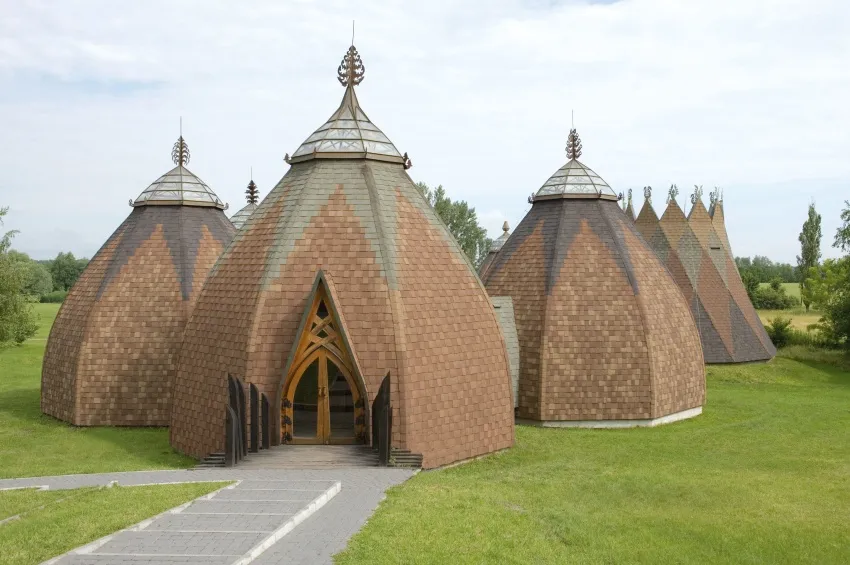
Departure by coach towards Ópusztaszer National Heritage Park.
In the company of our guide, we will discover Ópusztaszer National Heritage Park. We'll first set out to the roundhouse which holds the impressive panoramic painting by Feszty - The Arrival of the Hungarians. Then, we'll learn more about the Szeged flood from 1879 inside the Lockmaster's house and discover an exhibition about Man and the Forest inside crown-shaped tents. Afterwards, we'll move on to the open-air ethnographic museum with its typical farms from the Szeged region, a windmill, a primary school and more. Enjoy some free time in the park before returning on board.
PLEASE NOTE
- Good walking shoes are recommended: visit entirely on foot.
- The order of the visits can change.
- Times are approximate.
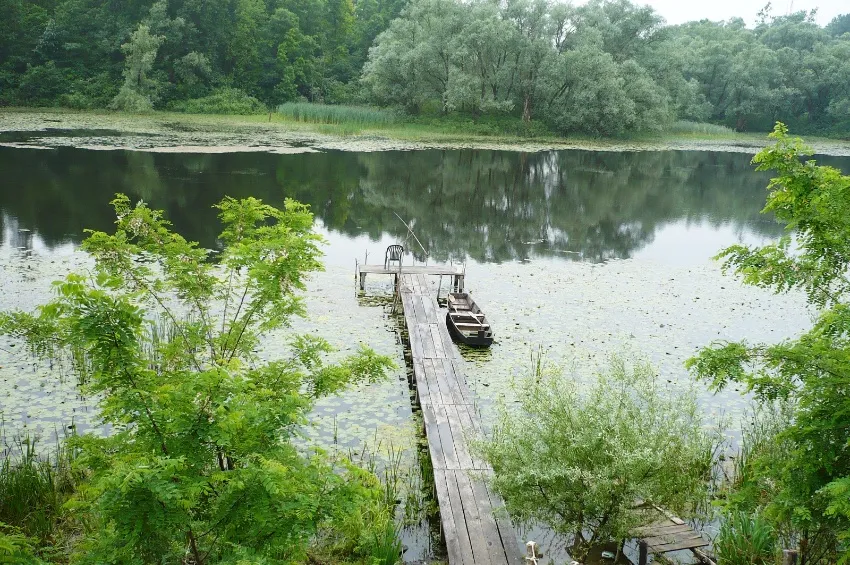
Departure by coach from Jasenovac towards Lonjsko Polje, the largest protected wetland in both Croatia and the entire Danube basin where you'll be able to admire migratory birds. We'll then move on to Krapje to attend a short introductive film about this particular region. We'll stop in the small village of Cigoc where we'll visit a typical local house with its stork's nests. The visit will end with a tasting of local products in an authentic Slavonia farmhouse.
PLEASE NOTE
- Good walking shoes are recommended.
- The order of the visits can change.
- Times are approximate.
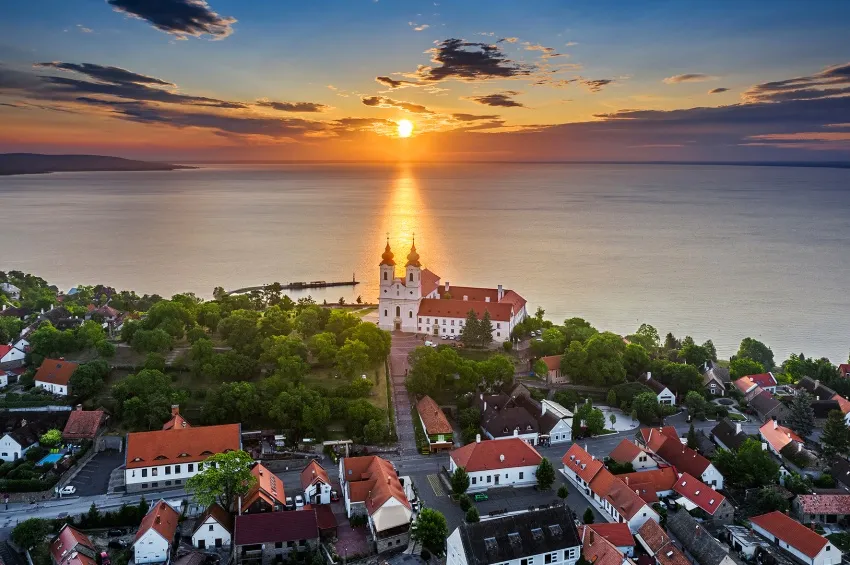
We’ll leave for a guided tour of Tihany to explore its historic, architectural, and natural treasures. Located on the shores of Lake Balaton, the first nature preservation area in Hungary was developed here in 1952. A Benedictine monastery established by the Kingdom of Hungary in 1055 holds the tomb of King Andrew, who strengthened the position of Christianity in the kingdom and successfully defended its independence against the Holy Roman Empire. The abbey surroundings offer a stunning panorama of Lake Balaton’s sparkling water. After some free time on your own, we’ll head for Balatonfüred, one of the oldest health resorts on the northern shores of the lake. Visitors come to enjoy the mild micro-climate, beautiful scenery, the local wine, sailing and swimming facilities, and of course, the spas. The Tagore Promenade is the perfect place for a lakeside stroll. The port has a great view of the abbey and is brimming with busy cafés and bars for an afternoon drink.
PLEASE NOTE
- The order of the visits can change.
- Times are approximate.
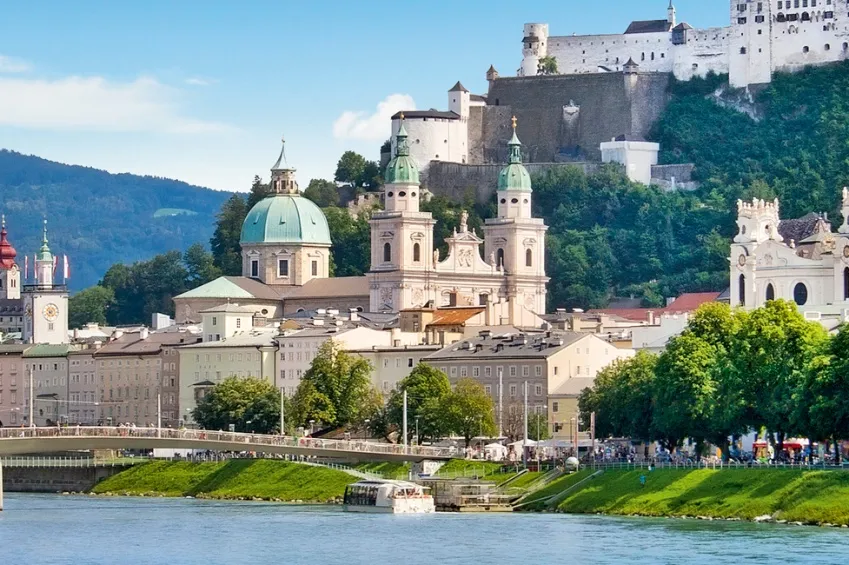
Salzburg is the “Sound of Music” city! Not only did the real Trapp family once live here, this movie classic was also filmed in and around the city. So join us for a tour following the footsteps of Maria von Trapp and Julie Andrews! And of course, Salzburg is the city of Mozart. You’ll experience the city’s rich history by visiting its most important tourist attractions. These include Mozart's birthplace and the area around the Salzburg Festival. The tour includes some free time when you can visit Saint Peter’s Abbey, the cemetery, and the catacombs. Our walk will finish up at Residenzplatz in the historic center of Salzburg.
PLEASE NOTE
- The itinerary for the excursion can be modified to adapt to the health conditions of the participants.
- The times and orders of the visits are for informational purposes only and can change.
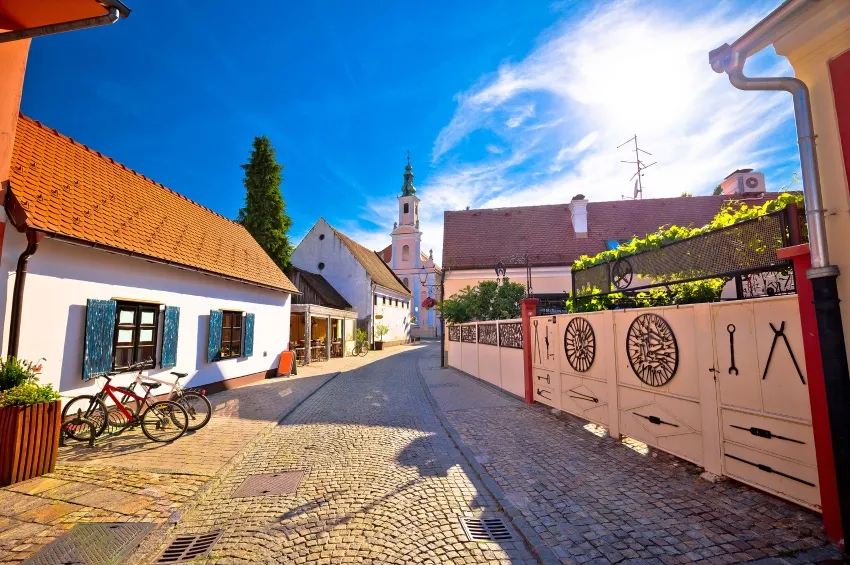
We’ll leave by coach for Varaždin, the center and seat of the County of Varaždin, about 50 miles north of Zagreb. Enjoy a historic tour of the city, an absolute gem of Baroque architecture. It is one of the most important tourist centers in northern Croatia. The city center, often compared to Vienna, was miraculously spared during the violent conflicts in the 20th century. Within this relatively small area are well-preserved palaces; important public buildings; Baroque, Rococo, Classicist and Secessionist houses and villas; and one of the oldest city halls in Europe.
PLEASE NOTE
- The order of the visits can change.
- Times are approximate.
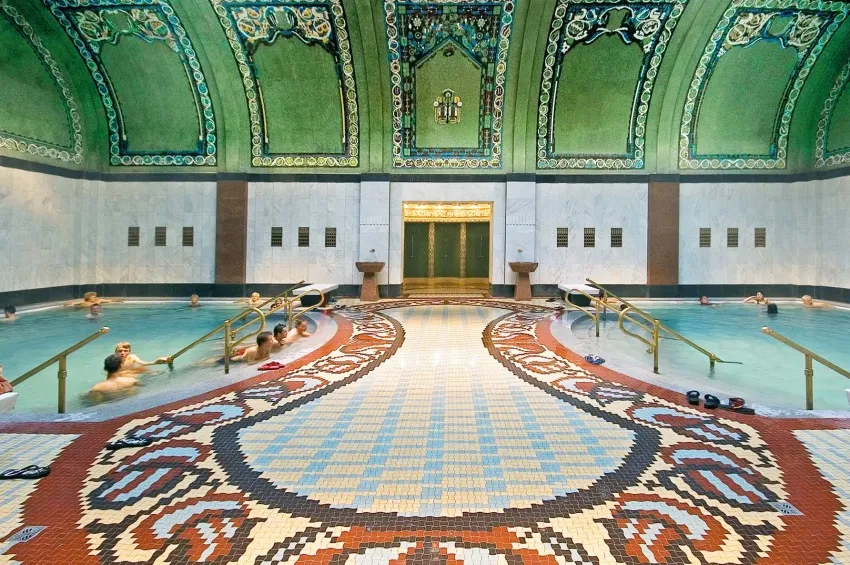
You'll set out with your guide to visit the famous Gellert Baths and Spa. Now part of the famous Hotel Gellert in Buda, references to the spa's healing waters have been found from as early as the 13th century. The current spa was founded in 1918, and a visit to the Art Nouveau thermal baths is a beautiful and historical experience. The special attractions are its indoor and outdoor swimming pools, wave bath, sunbathing terrace and thermal spa. After our tour, take some time to relax and enjoy the saunas, the terrace looking at Gellert Hill, or the geothermal pools with some beer, wine, or champagne in hand. This is an exceptional tour in one of the most historical places in the city, but don't take our word for it, come and see for yourself. Afterwards, we'll return to the ship.
(Don't forget to bring your swimsuit!)
PLEASE NOTE
- Good walking shoes are recommended.
- The order of the visits can change.
- Times are approximate.
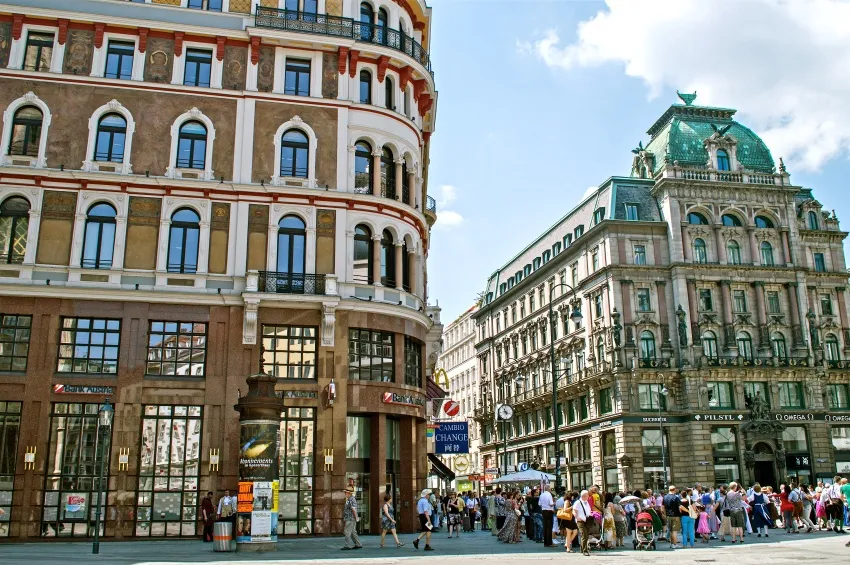
Our guide will meet us at the ship, where we'll set off on foot for the subway station to discover the high art of Viennese living. We'll stroll through the city and visit back stage in the Konzerthaus concert hall, which has the Vienna Symphony, Vienna Chamber Orchestra, Wiener Singakademie and Klangforum Wien in residence. We'll tour the prominent institution that features about 750 events per year with our guide who will explain the hall's history. We'll head back stage where we might be able to catch a glimpse of a performer or two! After our tour, relax in one of the local cafés and enjoy a steaming cup of Vienna Coffee and a delicious pastry. After our tour, we'll return to the ship on the subway.
PLEASE NOTE
- Good walking shoes are recommended.
- The order of the visits can change.
- Times are approximate.
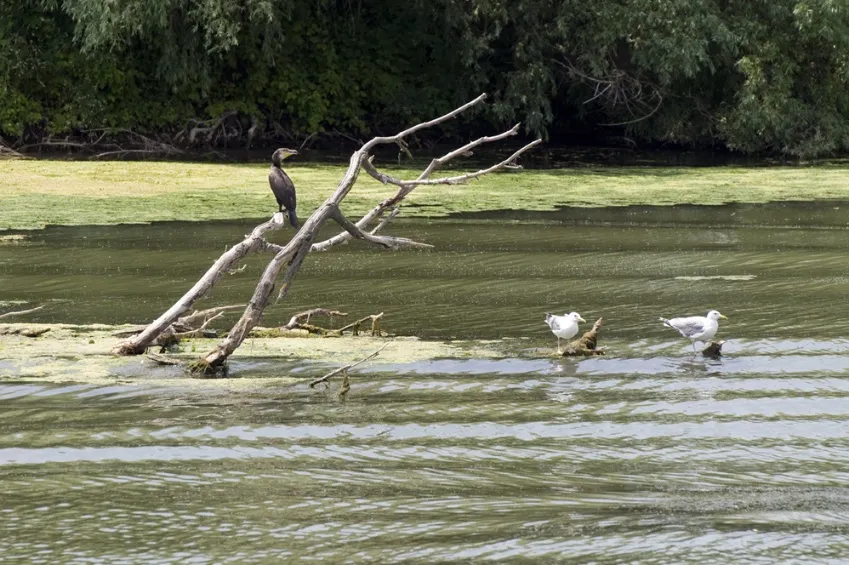
We'll begin with a 500m walk (approx.) and then board a tourist pleasure boat to begin our visit of the Danube Delta. We'll board these small local boats (with a capacity of 50 passengers) to discover the flora and fauna of this biosphere in the company of our guides.
The site today is one of 300 international biosphere reserves designated by UNESCO to try to measure the impact of Man on the environment. The human presence on the North and South banks of the Delta has been in evidence since Neolithic times, when the Delta was still only a gulf in the Black Sea. The Danube Delta is home to more than 1200 different varieties of plants, 300 species of birds and 45 different freshwater fish varieties in its many lakes and marshes. During our visit, we may be lucky enough to catch a glimpse of some white pelicans, dwarf cormorants or glossy ibis or other species.
We'll return to our ship on foot.
PLEASE NOTE
- Caps and sunglasses are recommended.
- The order of the visits can change.
- Times are approximate.
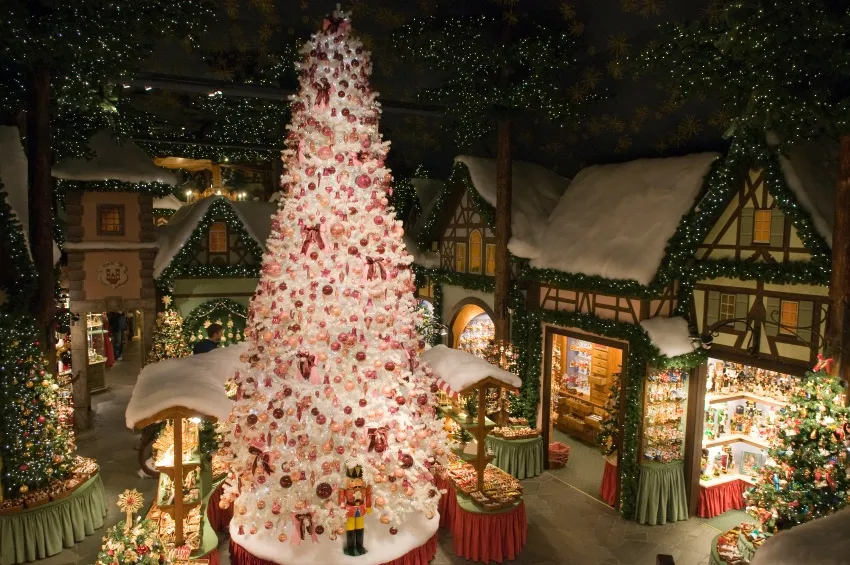
Departure by coach in the company of your hostess for the charming town of Rothenburg. Located along the "Romantic Road", this town has kept its Renaissance layout virtually intact as it has not undergone any changes since the Thirty Years' War, making it one of the most authentic towns in Germany. A local guide will lead you to the 15th century ramparts, the Spital Bastion, the Market Square and Town Hall as well as the renowned St James's church (exteriors only). After your guided walking tour, you will have some free time to stroll through the romantic streets, visit some of the museums such as the Criminal Museum exhibiting instruments of torture, the Christmas Museum or the Doll and Toy Museum - entrance fees to be paid on location - or have a taste of some of the local specialties.
Return on board by coach.
PLEASE NOTE
- Good walking shoes are recommended: the streets are cobbled.
- The order of the visits can change.
- Times are approximate.
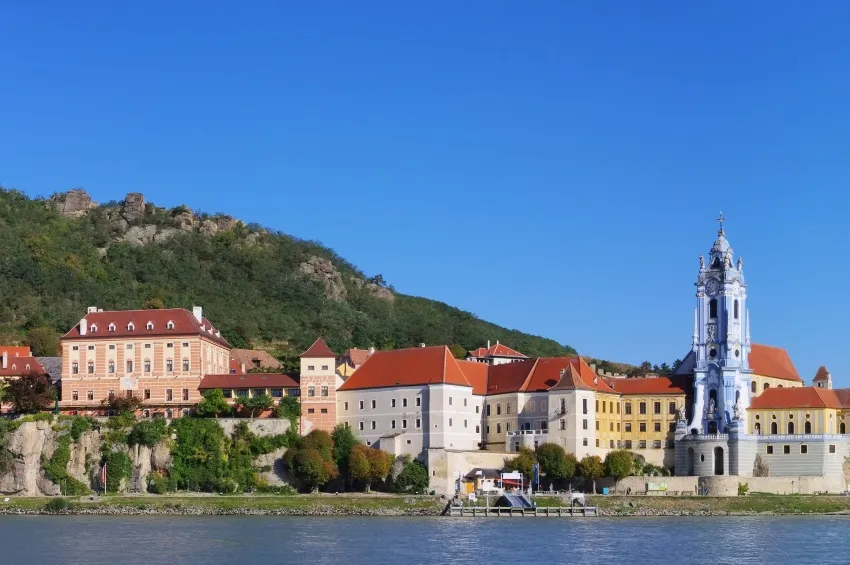
Departure by coach in the company of your hostess for the village of Dürnstein. You will drive through the Austrian Wachau dotted with charming villages and ruins of medieval castles all the way to Dürnstein. This town is well-known for its castle where legend has it that Richard the Lionheart was held prisoner by Duke Leopold IV after their falling out during the third crusade and later rescued by his faithful confident, Blondel.
You will have some free time in the village to taste the Austrian wine or the local specialty, apricot liqueur. You will be able to stroll through the streets of this medieval town and visit the Baroque abbey.
PLEASE NOTE
- Free visit of Dürnstein.
- Good walking shoes are recommended: the streets are cobbled and steep.
- Extra fee for the visit of the Abbey.
- The order of the visits can change.
- Times are approximate.
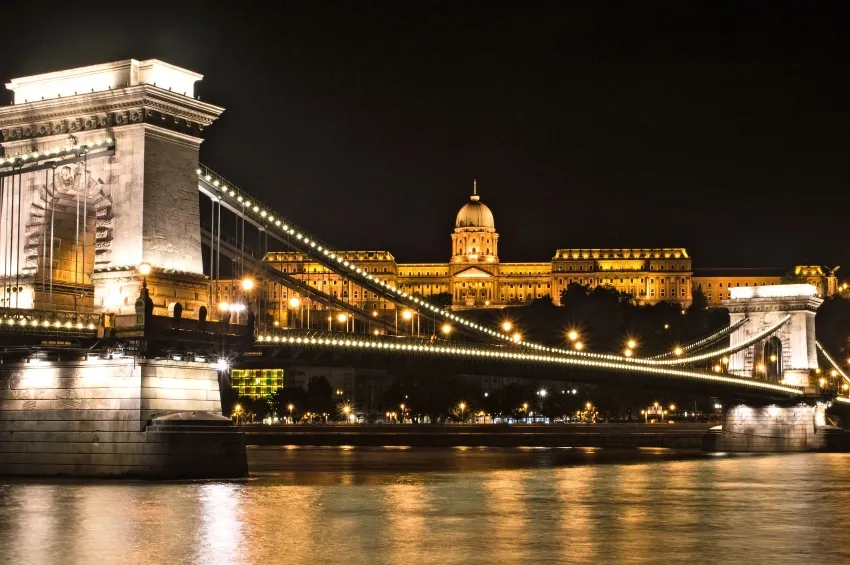
Transfer by coach in the company of your guides to a theater downtown for a traditional Hungarian show. This one-and-a-half-hour show will take you across all the regions of Hungary through its folklore and Gypsy dance and music. After this show, the traditions and folklore of this beautiful country will no longer hold any secrets! Return on board by coach.
PLEASE NOTE
- Depending on the number of participants the show can take place at another location.
- Times are approximate.
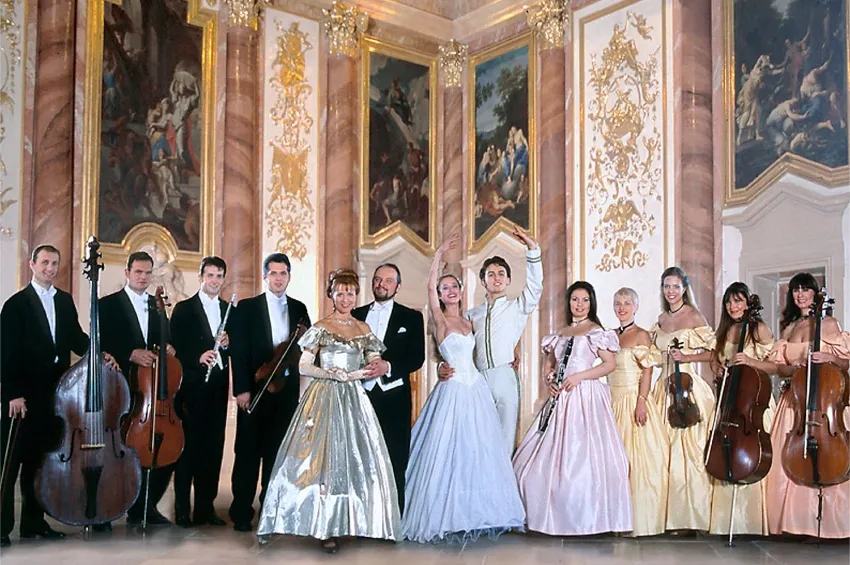
Departure by coach in the company of our host/hostess towards Vienna's Kursalon where the concert will take place. Famous waltz melodies will take you back to the era of Franz Joseph and Sisi. The first half of the concert will be devoted to Mozart compositions, and the second half to Strauss. The orchestra consists of eight to thirteen musicians, two singers and two dancers who will all make sure you have a good time. During intermission, a free drink will be served (orange juice or sparkling Austrian wine*). Return on board by coach.
PLEASE NOTE
- Please dress appropriately.
- Times are approximate.
- *Alcohol can be harmful to your health. Please drink in moderation.
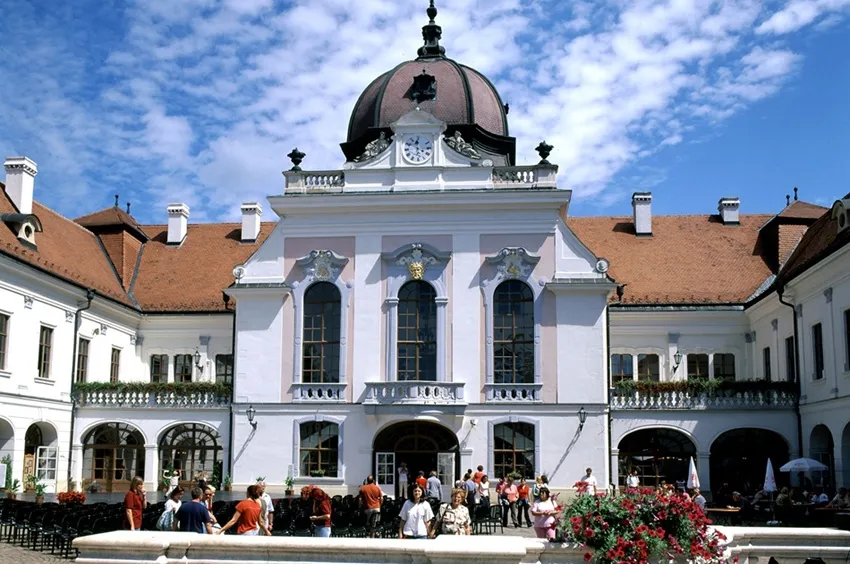
Departure by coach for Gödöllö Castle. In the company of your guide, you will visit Gödöllö Castle, one of the most important and largest Hungarian Baroque palaces, commissioned by Count Antal Grassalkovich. The castle is mainly known for having been one of the favorite residences of Empress Sisi, who loved to get away from the etiquette of the Vienna Court in Gödöllö. Your visit will take you through the Empress's apartments with their original decorations, including a majority of purple objects and wallpapers, in accordance with the Empress's favorite color. You will also see the Castle Church (behind a glass screen), Joseph I's Wardrobe, the Minor Coronation Hall, Franz Joseph's office and more. Return on board by coach.
PLEASE NOTE
- Upon arrival at the castle, the main stairway has to be climbed.
- The order of the visits can change.
- Times are approximate.
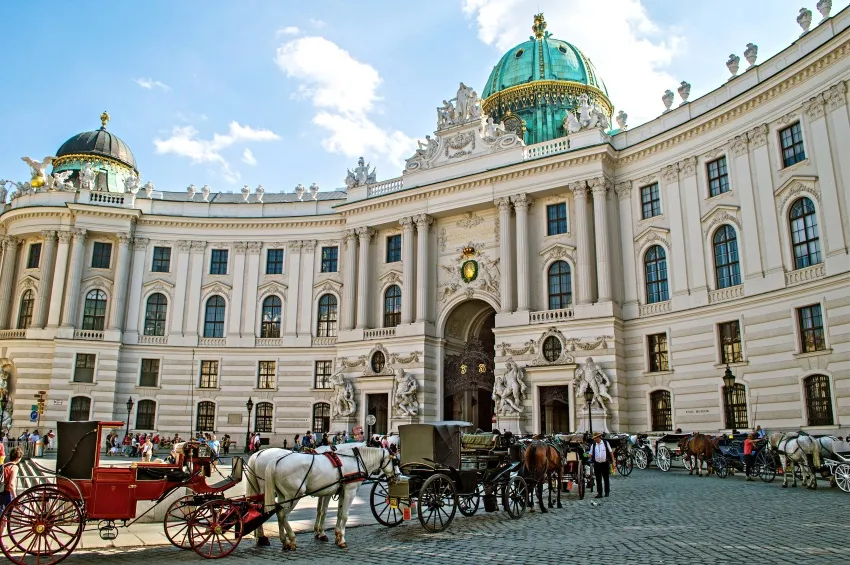
Departure by coach with your local guide. You will discover the Hofburg, which is also known for having been during 600 years the "Winter Residency" of the Habsburgs. Over the course of their reign, they turned this small 13th century fortress into a colossal and beautiful palace. The different buildings today mostly house museums and the gardens, dotted with monuments, have become the Volksgarten and the Burggarten.
We will climb up the Emperor's Staircase to reach the Sisi Museum which extends over six rooms that have been equipped to solely center on Elisabeth's private life. Here numerous personal items that once belonged to Elisabeth are used to help illustrate the true personality of the frequently misunderstood Empress. The sensitively designed exhibits are inspired by the monarch's poetry and illustrate how the once light-hearted young girl, Sisi, became a restless, unapproachable and melancholic woman. The more than 300 items on display in the museum include parasols, boxes and gloves which once belonged to Elisabeth, along with a reconstruction of the evening dress worn by 16 year old Sisi in 1854 before she left her home in Munich, and a replica of a section of her imperial railway carriage.
We'll then move on to Imperial Apartments and access the 19 official and private rooms that once belonged to Franz Joseph and Elisabeth. The Imperial Apartments are a reflection of the monarchic splendor. You will get to see the Emperor's Audience Chamber, his Conference Room, and his bedroom before peering through Elizabeth's apartments with her salons, lavatory and bathroom and her dressing and exercise room where Elizabeth spent most of her time.
Return to the boat.
PLEASE NOTE
- Before arriving to the Hofburg, a 5 minute walk is necessary.
- There are stairs to access the Hofburg.
- The order of the visits can change.
- Times are approximate.
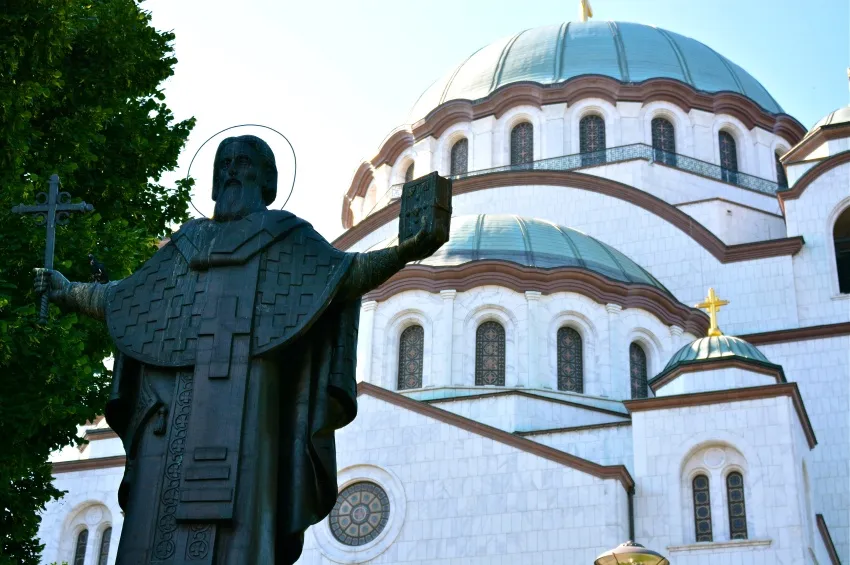
Departure by coach for our excursion to generous Slavonia through the lush green hills dominating the Sava plain.
We will start off with a visit of Pozega, a small town famous for its wine and delicacies. History unfolds downtown through various monuments and fine examples of Baroque architecture. Enjoy some free time strolling down the streets of the city and marvel at the Plague Column and the Holy Trinity Square and Church. Our visit continues to the eco-ethno village of Stara Kapela which has managed to preserve its houses, traditional farms and crafts. We'll be greeted by the villagers and enjoy a tasting of local specialties to the sound of tamburitzas - long-necked lutes with plucked strings. Renovation work in the village was meticulously carried out according to tradition and using materials from the region itself, restoring each house to its original appearance. Don't miss the wooden columns! Beautiful lines from the most talented Croatian poets unwind next to the light bulbs. Every visitor can get an idea of what life used to be like back in the days thanks to the large amount of original furniture and tools that were bought thanks to the Eko-Etno Selo Association which started the renovation project. No cars and no phone signal are to be found in Stara Kapela whose very concept is to suggest a different lifestyle - far from the usual rush and stress of an urban life, closer to nature and harmonious living together. In Stara Kapela, experience an authentic throwback you'll never forget!
PLEASE NOTE
- Good walking shoes are recommended.
- The order of the visits can change.
- Times are approximate.
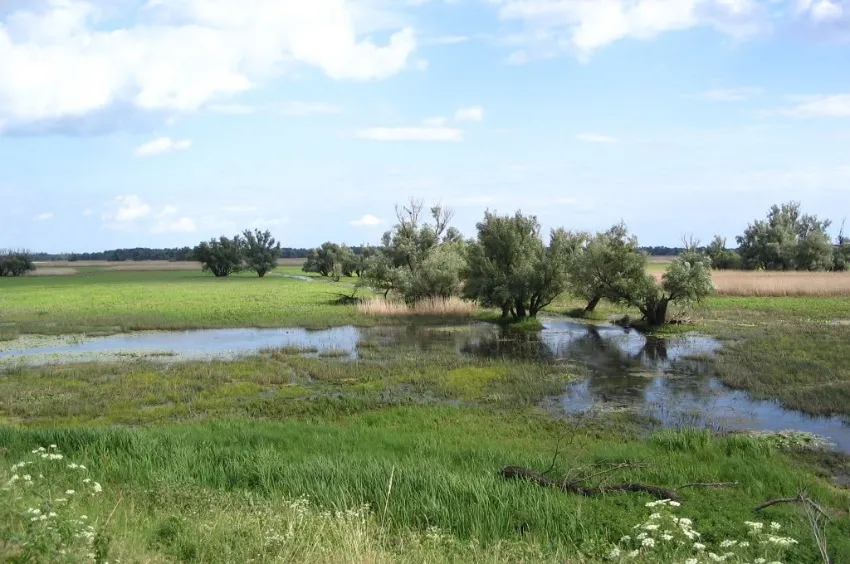
In the company of our guides, we will begin our tour with a visit of Osijek, a town in the East of the historical Croatian region of Slavonia. The town was founded by the Slavs, who built a river port on the ruins of the Roman town in the 7th century. In 1526, the Turks took possession of the town and remained there for over 160 years, making Osijek the capital of Ottoman Slavonia. But in 1687, they suffered a heavy defeat in Harkany and left the town without a fight. It was looted by the Austrians, who left nothing of its Ottoman splendor. The Austrians built a citadel over the demolished Turkish town.
Our tour will first take us to the upper town for a view of the Church of St Peter and St Paul. Commonly referred to as the Cathedral, this imposing red brick church dominated by its 90m spire was built under the impetus of Bishop Strossmayer, a native of Osijek. We'll then move on to the Old Town with a visit of the 18th century fortress built between 1712 and 1721 by architect Maximilien Gosseau d'Hennef who designed the citadel's civilian and military buildings, giving the whole a remarkable architectural unity. Afterwards, we'll walk up to the main square with its Holy Trinity monument.
The tour finishes with the Kopacki Rit Nature Park, located northwest of the confluence of the Drava and the Danube at the border with Serbia. It is one of the largest protected wetlands in Europe. Part of the Kopacki Rit Park is strictly protected as a bird reserve. If you are lucky, you may be able to see some of the 260 species of birds that nest in this area, such as wild geese, wild ducks, the black woodpecker, and the numerous mammals that live in the park, including deers, roe deers, wild boars, wild cats, martens, stone martens and more.
PLEASE NOTE
- Good walking shoes are recommended.
- The order of the visits can change.
- Times are approximate.
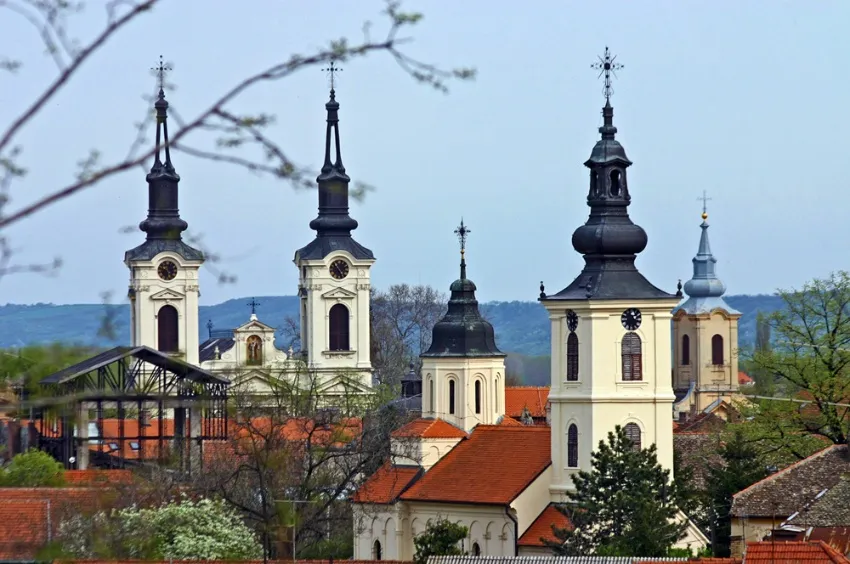
Departure from Sremska Mitrovica by coach in the company of your guides to discover the Autonomous Province of Vojvodina. During its eventful history, Vojvodina was successively dominated by numerous invaders coming from all over Eastern Europe before finally being attached to Serbia.
More than 16 Orthodox monasteries are spread around the hamlet of Irski Venac, a great opportunity to soak up Serbian art combining Byzantine and Baroque architecture. You will be delighted by the magnificent paintings from the 18th century that adorn the beautiful 16th century Krusedol monastery.
We'll then move on to Sremski Karlovci, a small peaceful town of 9,000 inhabitants on the banks of the Danube. In the 17th century when the Turkish were no longer a threat, the city became the Serb cultural center in the Austro-Hungarian Empire and seat of the Orthodox Patriarchate. The cultural influence of the city extended with the creation of the first Serbian high school in the 17th and 19th centuries where the greatest writers and theologians met. A walk through this romantic city will allow you to see the 18th century Cathedral and its many pieces of Serbian Religious Art that evoke the city's past glory.
PLEASE NOTE
- Comfortable shoes are recommended.
- Please dress appropriately to visit the monastery (no shorts, no T-shirt, shoulders covered for ladies and closed shoes).
- The order of the visits can change.
- Times are approximate.
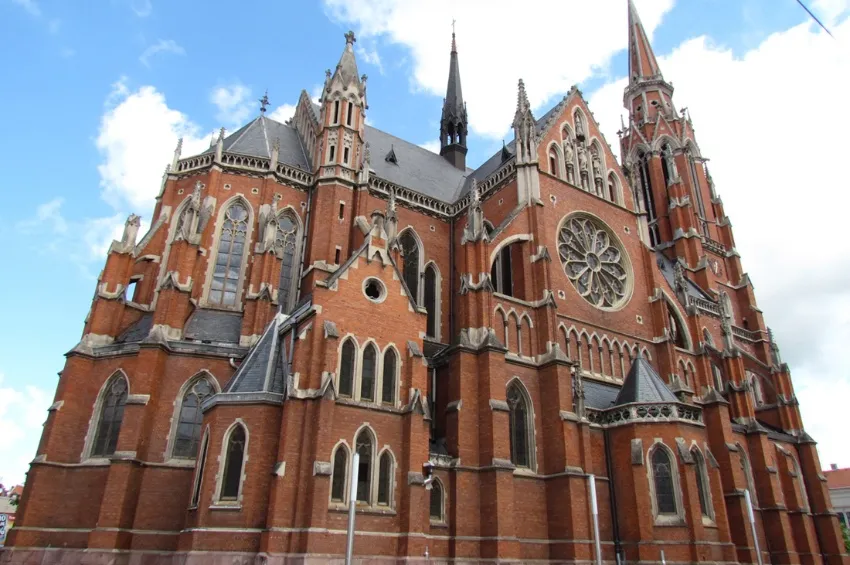
In the company of our guides, we will begin our tour with a visit of Osijek, a town in the East of the historical Croatian region of Slavonia. The town was founded by the Slavs, who built a river port on the ruins of the Roman town in the 7th century. In 1526, the Turks took possession of the town and remained there for over 160 years, making Osijek the capital of Ottoman Slavonia. But in 1687, they suffered a heavy defeat in Harkany and left the town without a fight. It was looted by the Austrians, who left nothing of its Ottoman splendor. The Austrians built a citadel over the demolished Turkish town.
Our tour will first take us to the upper town for a view of the Church of St Peter and St Paul. Commonly referred to as the Cathedral, this imposing red brick church dominated by its 90m spire was built under the impetus of Bishop Strossmayer, a native of Osijek. We'll then move on to the Old Town with a visit of the 18th century fortress built between 1712 and 1721 by architect Maximilien Gosseau d'Hennef who designed the citadel's civilian and military buildings, giving the whole a remarkable architectural unity. Afterwards, we'll walk up to the main square with its Holy Trinity monument.
Return on board.
PLEASE NOTE
- Comfortable shoes are recommended.
- The order of the visits can change.
- Times are approximate.
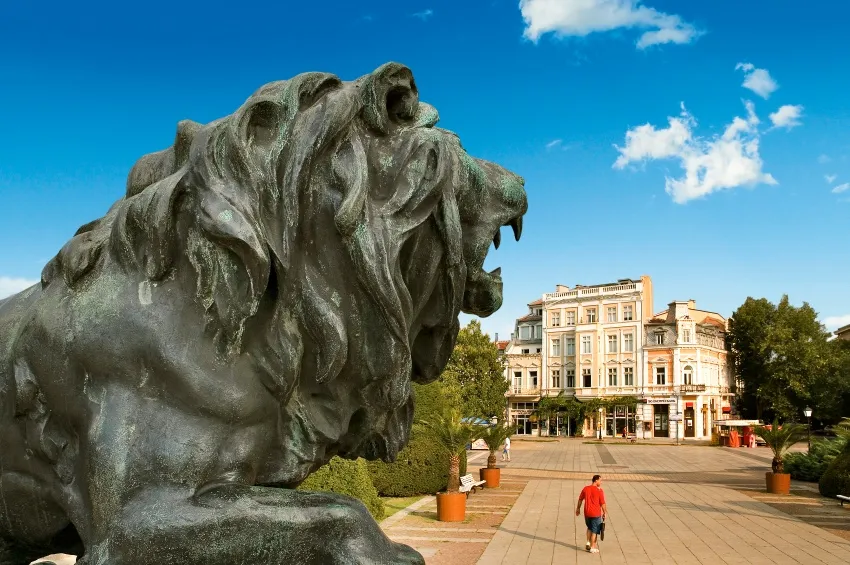
We'll leave by coach to explore the city of Ruse and the rock monastery of St. Dimitar Basarabovski. The monastery is the only functional men's rock monastery in Bulgaria, a site filled with history and still a true place of worship and everyday life. We'll then head to Ruse, one of Bulgaria's most elegant cities. With its imposing Belle Époque architecture and neatly trimmed leafy squares, it's as if a little chunk of Vienna had broken off and floated down the Danube. You'll see the Dohodno Zdanie, the Roman Catholic St. Paul of the Cross Cathedral, and the Monument of Liberty. Enjoy some free time before returning to the ship by coach.
PLEASE NOTE
- Good walking shoes are recommended.
- The ship sails during the excursion.
- The order of the visits can change.
- Times are approximate.

In the company of our guides, we will leave for a panoramic tour of Budapest, the Pearl of the Danube. First we will head for the hills of Buda by crossing the Elizabeth Bridge and we will go up to the Castle quarter, from where we'll enjoy a fantastic panoramic view of the city. We will walk round the castle quarter and on to the Fisherman's Bastion, built in neo-Roman style in 1902 for the simple pleasure of offering a panoramic view over the city and the Danube. Behind the Bastion, we will find Matthias Church which notably was the venue for the coronation of Emperor Franz Joseph and his wife "Sissi". Our coach will then take us down to the plains of Pest. There, we will visit Heroes' Square whose central monument depicting Prince Arpad and the chieftains of seven Magyar tribes was built for the millennium of Hungary. We will pass by the famous Szechenyi thermal baths, the zoo - a true piece of architecture - Vajdahunyad Castle and more. We will walk through the famous Andrassy Avenue and pass by St. Stephen's Basilica whose construction began in 1851 and was only completed in 1905. We will walk along the river and see the famous Parliament building overlooking the Danube with its white silhouette in the Byzantine and neo-Gothic styles. Return on board.
For cruises MVI/MVI_PP/NVI/NVI_PP:
Our visit will end at Vörösmarty Square where we'll discover one of the oldest, richest and most spectacular of all the Christmas markets in Budapest - an old folk tale with its dozens of buzzing wooden market stalls and thousands of handmade gifts. Have a taste of the traditional cinnamon pastries (Kurtoskalacs - Chimney Cake), sausages, mulled wine, grilled vegetables, and street snacks like Langos and dodolle (potato dumplings). Following our tour, we'll return to the boat.
PLEASE NOTE
- The order of the visits can change.
- Times are approximate.
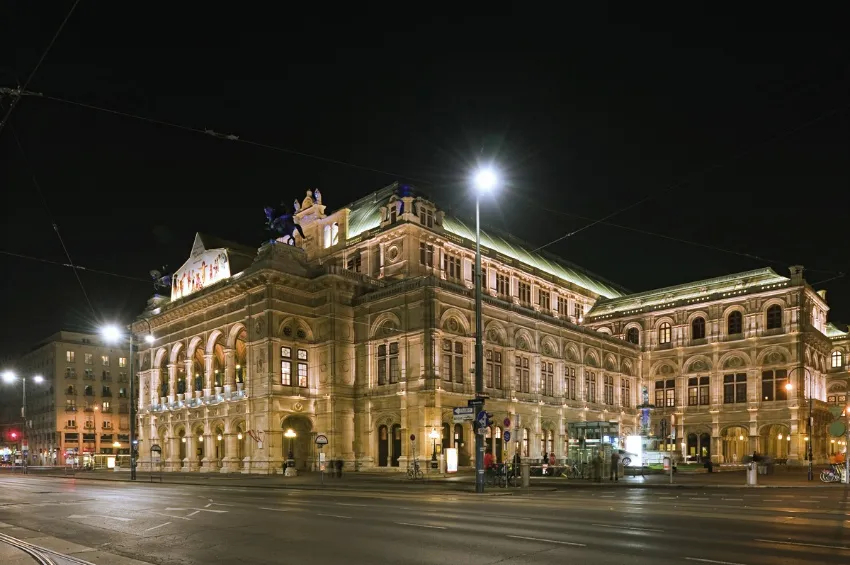
You'll leave by coach with your guides to visit the Imperial Crypt, located beneath the Capuchin Church. One hundred and forty-nine Habsburgs, including 12 emperors and 19 empresses and queens, have been laid to rest here since 1633. Hapsburg funerals were elaborate affairs, and the death of an emperor or empress meant not only the creation of an elaborate and beautiful sarcophagus for the Imperial Crypt, but also a silver urn to preserve their heart and reliquaries to contain their embalmed entrails. The crypt holds 105 metal sarcophagi, the most elaborate of them designed by the royal sculptor Balthasar Ferdinand Moll. The last emperor buried here was Franz Joseph I in 1916. This visit will bring you right to the epicenter of the illustrious Austrian Empire and its celebrated history.
The next stop will be the Austrian National Library, considered as having one of the most beautiful library halls in the world. It is the largest Baroque library in Europe. A magnificently painted dome with frescoes by Daniel Gran covers the impressive State Hall—almost 262 feet (80 m) long and 66 feet (20 m) high. The library contains more than 200,000 volumes. The most prominent works are the 15,000 books from Prince Eugene of Savoy and the vast Reformation writings of Martin Luther. After our visit, we'll return to the ship.
PLEASE NOTE
- The order of the visits can change.
- Times are approximate.
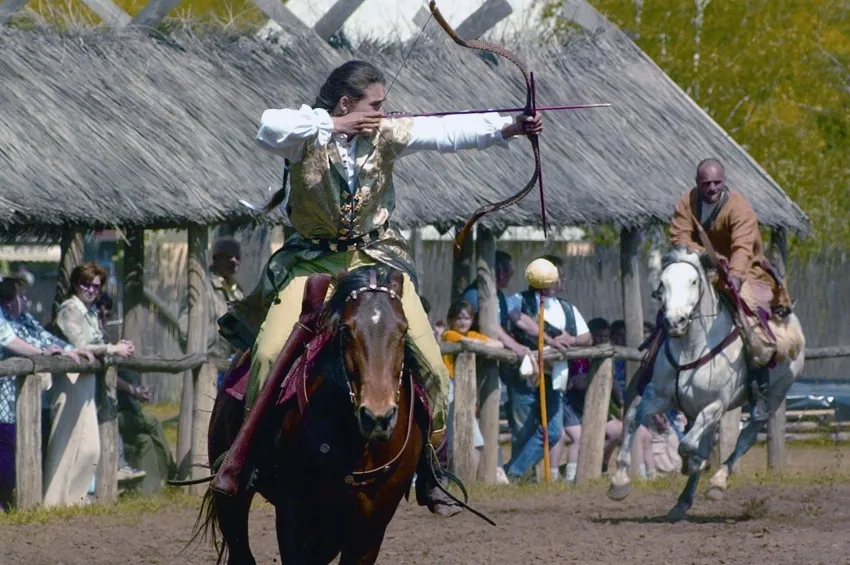
Departure by coach in the company of your host/hostess in the direction of Kiskunsag Park, at the heart of the Puszta.
The Puszta, also known as the Great Plain of Hungary, is a large, flat grassland that was regarded as the Wild West of Hungary in the 19th century with cow-boys watching over colossal cattle herds grazing on pasture. The Puszta has been listed as a World Heritage Site by UNESCO since 1999.
Riding aboard a charabanc - a traditional horse-drawn carriage with wooden benches - you'll be amazed by the wonderful landscapes and unusual fauna of the Puszta. In a small part of the Hungarian Steppe, you'll get to observe Racka sheep with their spiral-shaped horns, Mangalica pigs with their curly coats and Hungarian Grey cattle with their long, curved horns, as well as rare species of birds. In the course of your visit, you'll get the chance to attend a traditional equestrian show while tasting* "palinka" (plum eau-de-vie) and some "pogacsa" (small savory buns) as well as mineral water, sheltered from the sun under a thatched roof. The csikós, the mounted horse-herdsmen of Hungary dressed in traditional blue attire, will invite you to take part in their "games of skill and ability”. Return on board by coach.
PLEASE NOTE
- Good shoes, sunglasses, caps and a bottle of water are recommended.
- *Alcohol can be harmful to your health. Please drink in moderation.
- The order of the visits can change.
- Times are approximate.
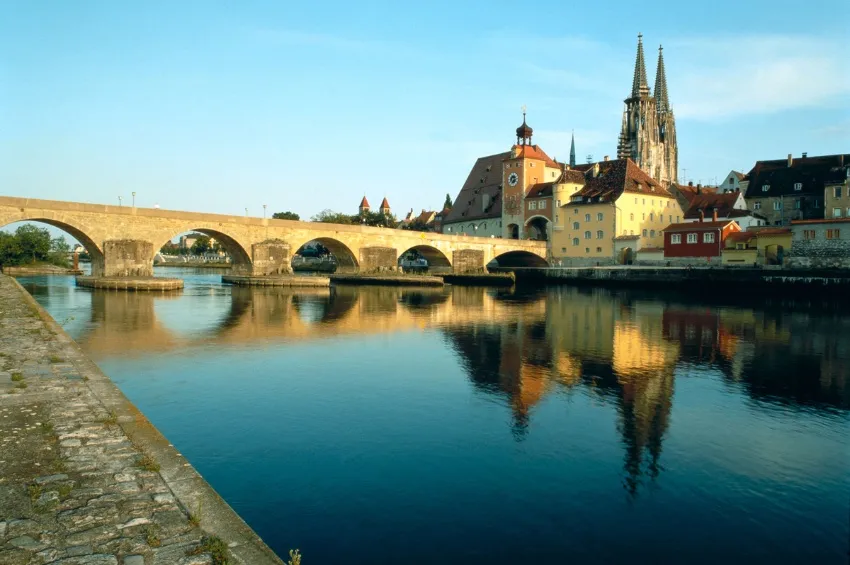
Regensburg saw its political and economic heyday in the 12th and 13th centuries when it was located at a crossroads between major trade routes and became a Free Imperial City in 1245 until other great Bavarian cities were preferred. This poorly industrialized city wasn't heavily targeted by allied bombings and has thus kept an almost intact medieval center.
Before our visit to Regensburg, our coach will take us to Walhalla, a huge Greek style marble temple overhanging the Danube. Ludwig I of Bavaria mandated the construction of this temple between 1830 and 1842 as a memorial dedicated to Germany's most influential worthies. Inside, we'll take a look at some 129 busts depicting German characters such as artists, military leaders and more.
In the company of our guide, we'll set off on a visit of Regensburg on foot. We'll discover the imposing stone-built "Porta Praetoria” - the northern gate to the Roman fortress - the Old Town Hall containing the rooms occupied by the Imperial diet from 1663 to 1806, the Gothic Cathedral and the Italian influenced homes of wealthy merchants from the Middle-Ages.
Return on board.
PLEASE NOTE
- Good walking shoes are recommended as the streets in the old town are cobbled and it is necessary to walk on a mountain track to go to the Walhalla temple.
- The order of the visits can change.
- Times are approximate.
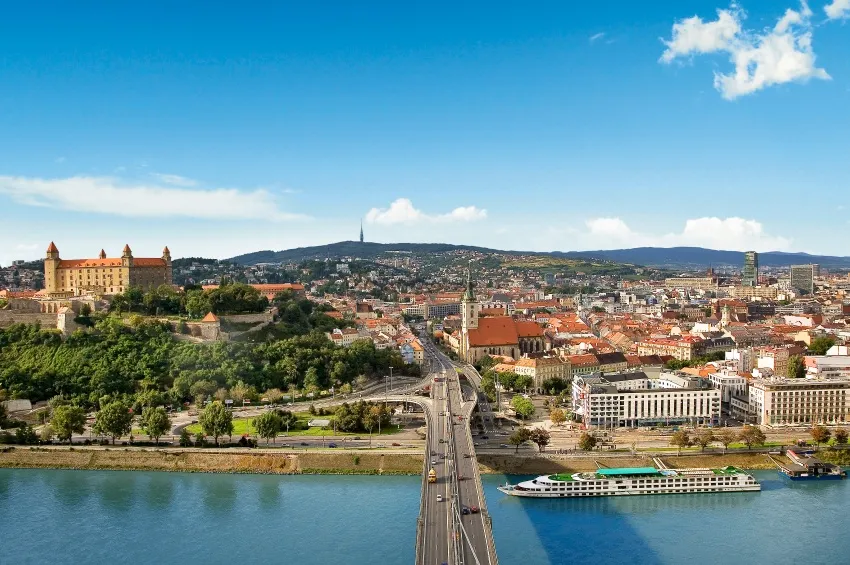
Bratislava, before becoming the capital of independent Slovakia in 1993 was first of all the capital of Hungary from 1536 to 1784 under the name of Presburg. It then belonged to Czechoslovakia before becoming the capital of the "Slovak Socialist Republic" as part of Czechoslovakia between 1969 and 1992.
Along with your guides, you will begin the visit with a panoramic tour of the city which will take you to Bratislava Castle (outsides), which dates from 1811, after the previous castle burned down, and from where you will enjoy a breathtaking view over the Danube and the city. The main historical monuments are located in the Old Town and the coach will drop you off at its entrance to continue the visit on foot. You will enter through Michael's Gate, which is the only gate still surviving from the Middle-Ages. Then you will head for the central square surrounded by elegant buildings, some in Art Nouveau style, and dominated by the old Bratislava Town Hall. The tour continues with the Primate's Palace (outsides) completed in 1781 for Archbishop Jozef Bathyány.
As you stroll through the streets, you may come across some of the amusing statues that are dotted around the capital. After the guided tour, you will have some free time and will return to the boat on foot or by coach depending on sailing times.
PLEASE NOTE
- Good walking shoes are recommended.
- The order of the visits can change.
- Times are approximate.
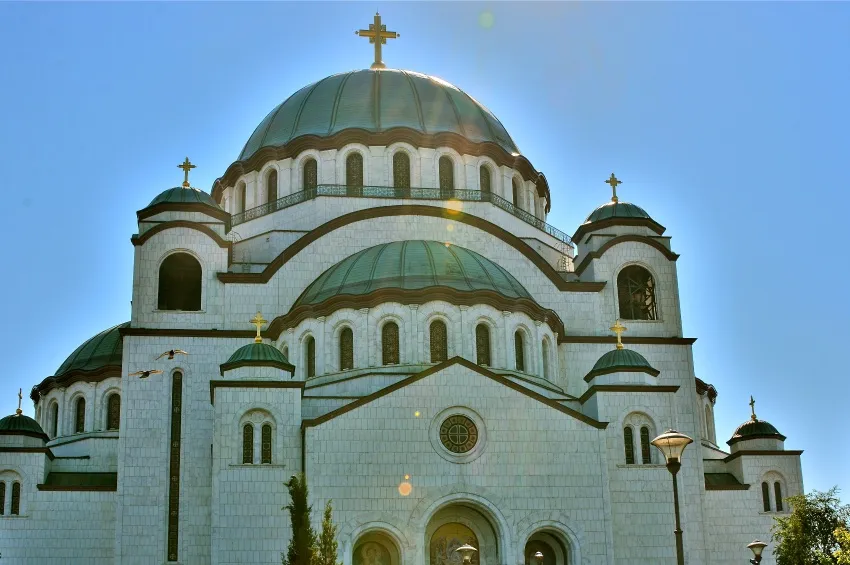
Transfer by coach in the company of your guides for the traditional evening in Belgrade which will take place in a Hotel. Enjoy one hour of enchanting traditional dances and songs that will take you through the various regions of Serbia.
After the show, you will join the Skadarlija district, a bohemian quarter nicknamed the "Serbian Montmartre”, for a pleasant walk.
PLEASE NOTE
- Good walking shoes are recommended.
- The order of the visits can change.
- Times are approximate.

You'll be transferred to the center of the city to enjoy a horse-drawn carriage ride through the old town and the famous Ring Road. A trip with a Fiaker is a great (and romantic) way of seeing the city in comfort because of the narrow streets and cobblestones.
PLEASE NOTE
- Times are approximate.
- The order of the visits can change.
- In case of high temperatures and for the well-being of the horses, the excursion can be cancelled without notice.
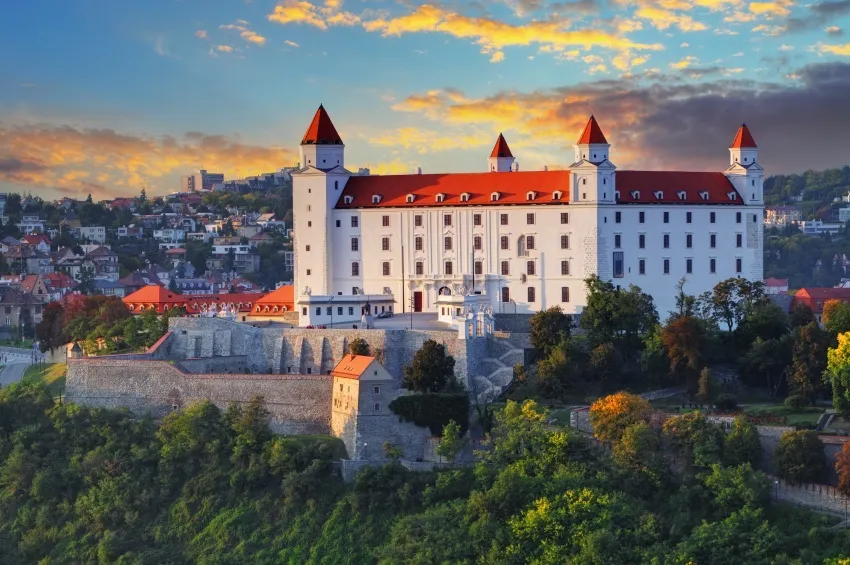
We'll leave by coach from Devínska Nová Ves for a hike in the Little Carpathians Protected Landscape Area, including the geographically rich Sandberg expanse. From Devin Castle, we'll take in the splendid view of Bratislava. After our hike, we'll return to the ship.
PLEASE NOTE
- Good walking shoes are recommended.
- The order of the visits can change.
- Times are approximate.
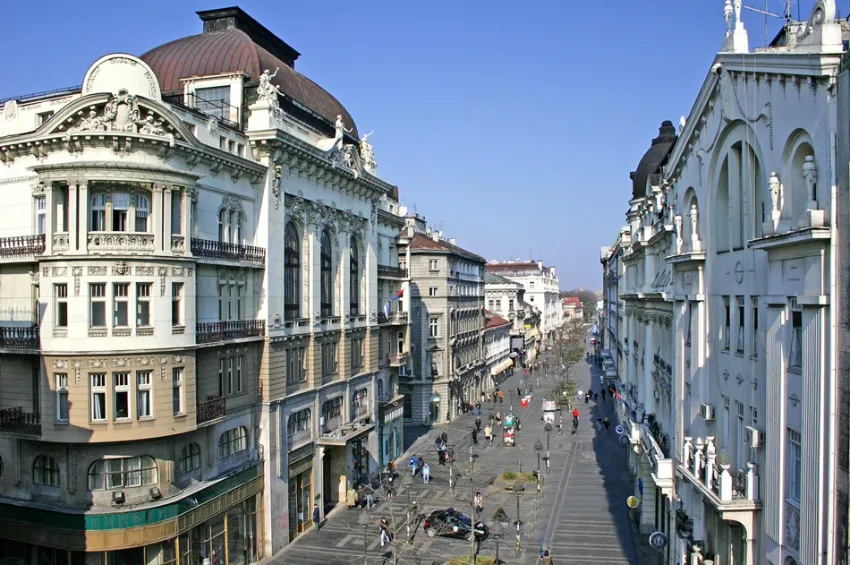
What better way to explore Belgrade than on a bike? You'll cycle along the history-filled streets with your guide who will explain the city's recent past from World War II to current times. The main topics are history and politics of Yugoslavia, social issues, economy, lifestyle and architecture.
A half hour break with a drink will be provided during the tour.
Main stops: Brankov’s bridge, Staro Sajmiste (former concentration camp), SIV / Palace fo Serbia (former seat of government of Yugoslavia), Hotel Yugoslavia, Historic city center of Zemun and view on Kalemegdan Fortress
PLEASE NOTE
- The total length of the tour is 12 kilometers.
- The speed on the tour is very low, so everybody can enjoy it; given one has a basic experience with riding a bike.
- Good walking shoes are recommended.
- The order of the visits can change.
- Times are approximate.
- Attention: children are under the responsibility of their parents and must be autonomous by bike.
- Helmets are provided on all our cycling tours.
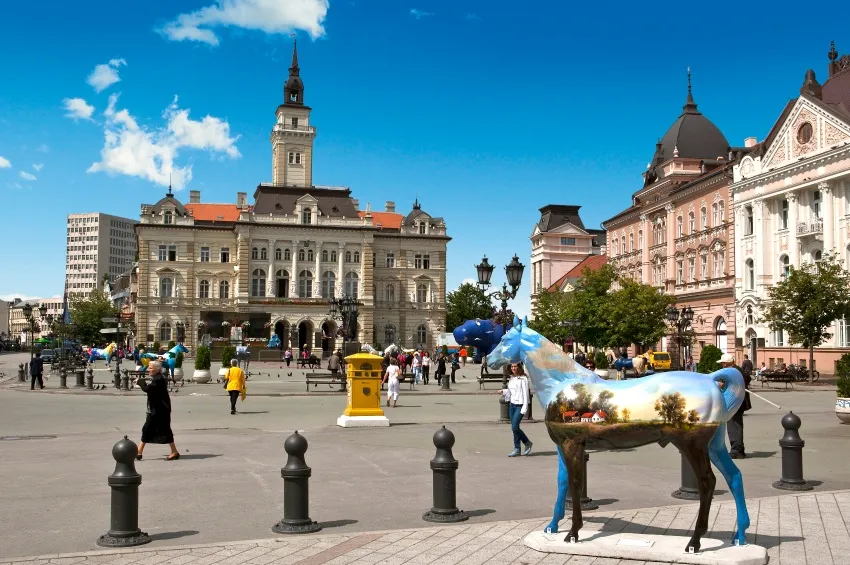
We'll leave the ship for an energetic walk to the Petrovaradin Fortress. We'll stroll along the riverfront before climbing the 200 steps up to the fortress. An exceptional work of 18th-century fortification engineering, it is one of the largest, most-complex and best-preserved artillery bastions in this part of Europe. It also contains a vast system of underground military galleries, with mine and listening tunnels, distributed across four levels running almost 10 miles long. The view from the fort is splendid, and we'll enjoy a snack during our hike.
PLEASE NOTE
- PLEASE WEAR COMFORTABLE, STURDY SHOES AND APPROPRIATE CLOTHING ACCORDING TO THE WEATHER.
- The order of the visits can change.
- Times are approximate.

Discover the fourth largest city in Croatia from the seat of a bike! The old part of the town, Tvrda, was built at the beginning of the 18th century and is a dream to cycle through. It is the best-preserved, largest ensemble of Baroque buildings in Croatia and consists of a Habsburg star fort built on the right bank of the Drava River. We'll return through several of the city's parks and a main avenue boarded by beautiful Art Nouveau buildings. Our tour will finish up in front of the cathedral before returning to the ship.
PLEASE NOTE
- PLEASE WEAR COMFORTABLE, STURDY SHOES AND APPROPRIATE CLOTHING ACCORDING TO THE WEATHER.
- The order of the visits can change.
- Times are approximate.
- Attention: children are under the responsibility of their parents and must be autonomous by bike.
- Helmets are provided on all our cycling tours.

On board a 7-passenger speed boat, you'll tour the Danube Delta and enjoy the flora and fauna, see the multiple natural and artificial canals, and walk away with impressions that will last a lifetime.
PLEASE NOTE
- Subject to favorable weather conditions.
- Please wear weather-adapted clothing.
- Limited availability.
- Times are approximate.
- The order of the visits can change.
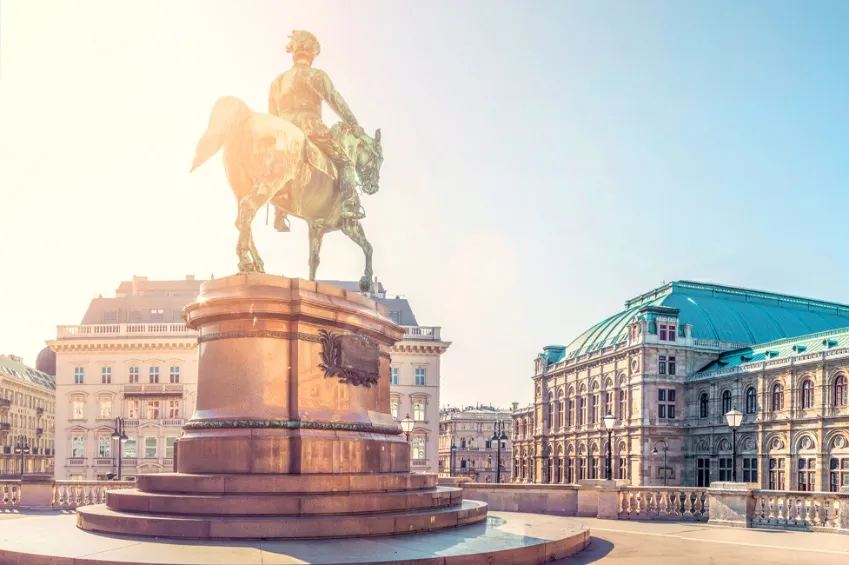
You will begin the tour by taking the famous Ring, one of the personal projects of Emperor Franz Joseph. In 1857, he decided to take down the ramparts that enclosed the city center and had this boulevard built lined with fine buildings. Along the Ring you will admire this architectural showcase of the old Austro-Hungarian monarchy, including the State Opera, the Hofburg Palace, the Natural History Museum, the City Hall, the Burgtheater and more.
PLEASE NOTE
- Comfortable shoes are recommended.
- If we have time, you will enjoy free time close to St Stephen's Cathedral.
- The order of the visits can change.
- Times are approximate.

We'll set out to discover the high art of Viennese living. We'll stroll through the city and visit back stage in the Konzerthaus concert hall, which has the Vienna Symphony, Vienna Chamber Orchestra, Wiener Singakademie and Klangforum Wien in residence. We'll tour the prominent institution that features about 750 events per year with our guide who will explain the hall's history. We'll head back stage where we might be able to catch a glimpse of a performer or two! After our tour, relax in one of the local cafés and enjoy a steaming cup of Vienna Coffee and a delicious pastry. After our tour, we'll return to the ship.
PLEASE NOTE
- In case the Konzerthaus is booked for shows or closed, we'll visit the Musikverein or the Opera instead.
- The order of the visits can change.
- Times are approximate.
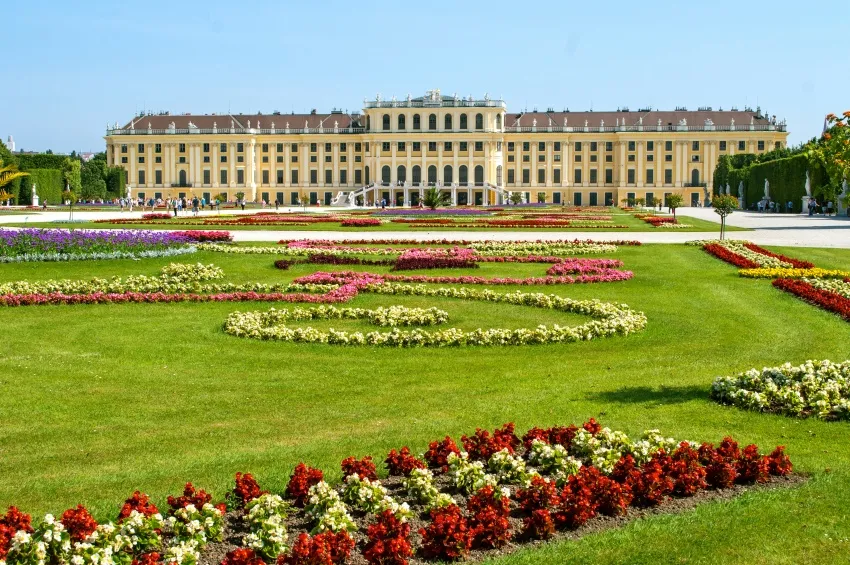
You will begin the tour by taking the famous Ring to reach Schoenbrunn Palace. When you arrive at Schoenbrunn Palace, you will be guided through the numerous rooms of the Hapsburgs' summer residence, which bear witness to the splendor of the Court at the time of Maria Theresa. You will also have some time to wander through the Palace gardens. Return on board by coach.
PLEASE NOTE
- The order of the visits can change.
- Times are approximate.
- Good walking shoes are recommended.
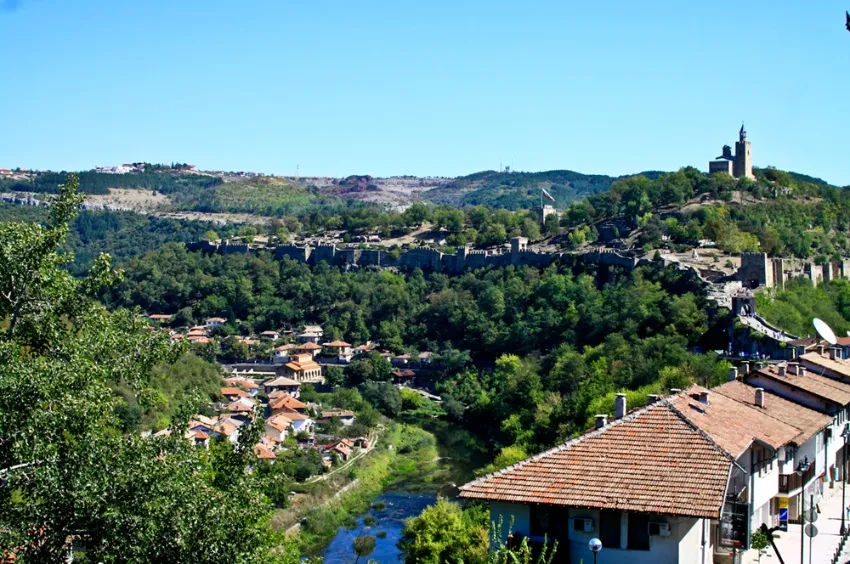
Departure by coach to Veliko Tarnovo, the medieval capital of Bulgaria but also the capital of the Second Bulgarian Empire, which was established at the heart of the country. The name "Veliko Tarnovo” first appeared at the end of the 12th century, when the city became the country's capital. The city remained known through time as the majestic and flourishing capital of the Second Bulgarian Kingdom. Veliko Tarnovo, with its medieval fortress of the Tsarevets Kings, is one of the oldest cities in the country and the regional administrative center.
We'll have lunch in a restaurant offering a wonderful view over the ruins of the fortress.
We'll move on towards Arbanassi in the afternoon. Located 4 km away from Veliko Tarnovo, this is one of the most visited villages in Bulgaria and is today listed as an "Architectural and Historical Reserve”. We'll visit the Church of Nativity, the oldest in Arbanassi. The naos, which is today strictly reserved for men, was originally an independent church whose murals date back to 1597. We'll continue with a visit of the Konstantzaliev family's house, an eye-catching structure with monumental architecture rich in details that was built in the 17th century. After our visit, we'll return on board by coach.
PLEASE NOTE
- Lunch included.
- Full day excursion, good walking shoes are recommended.
- The order of the visits can change.
- Times are approximate.
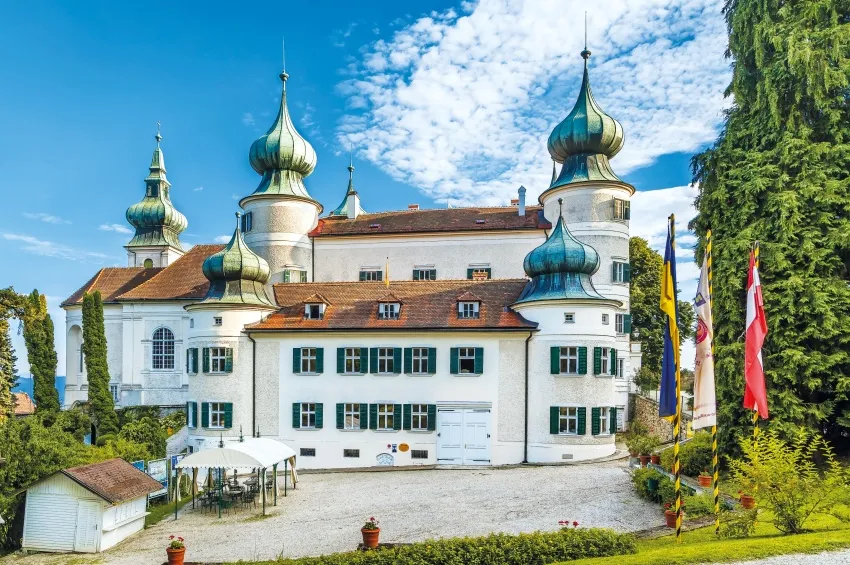
You'll leave by coach from Melk for a visit to Artstetten Castle. Used as a summer residence by the Habsburg dynasty, the castle is the resting place of Archduke Franz Ferdinand and Sophie, Duchess of Hohenberg. The museum in the castle features a permanent exhibition that provides insights into the life of the crown prince and his family. The castle is surrounded by an enchanting park, offering a fairytale-like setting for all who visit. The spacious park holds glorious chestnut tree avenues and a vintage bathing pavilion and is considered to be one of the most important historical parks in Austria. After the tour, you'll return on board in Melk.
PLEASE NOTE
- The order of the visits can change.
- Times are approximate.
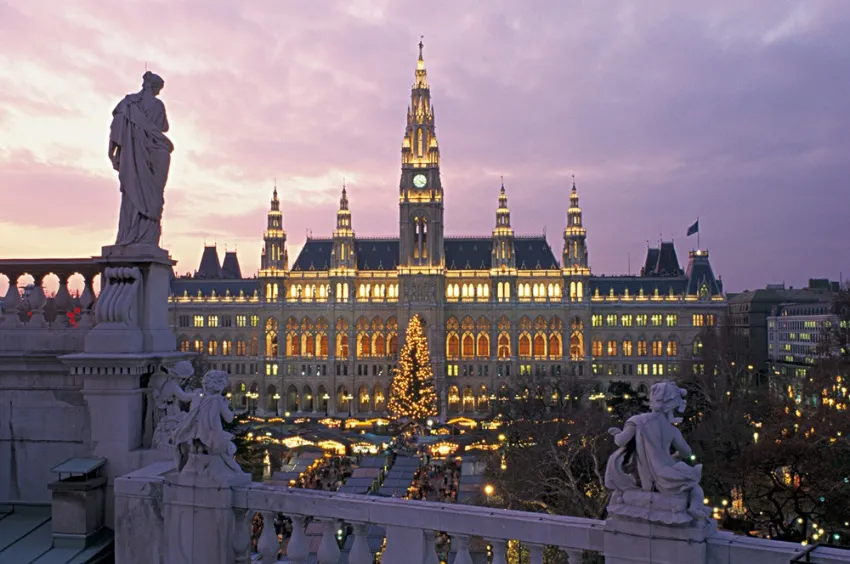
You will begin the tour by taking the famous Ring, which was one of the personal projects of Emperor Franz Joseph. In 1857, he decided to take down the ramparts that enclosed the city center and had this boulevard lined with fine buildings. Along the Ring you will admire this architectural showcase of the old Austro-Hungarian monarchy, including: the State Opera, the Hofburg Palace, the Natural History Museum, the City Hall, the Burgtheater and more.
For cruises MVI/MVI_PP/NVI/NVI_PP:
At the end of the visit, we'll return to the square in front of the city hall and take advantage of some free time to discover the traditional Vienna Magic of Advent market. Some 150 small chalets offer fine gifts and Christmas decorations for all ages, while the lights of the trees around the park shine brightly into the night. Enjoy some roasted chestnuts and a cup of warm mulled wine while strolling through the festive market.
PLEASE NOTE
- The order of the visits can change.
- Times are approximate.
- Good walking shoes are recommended.
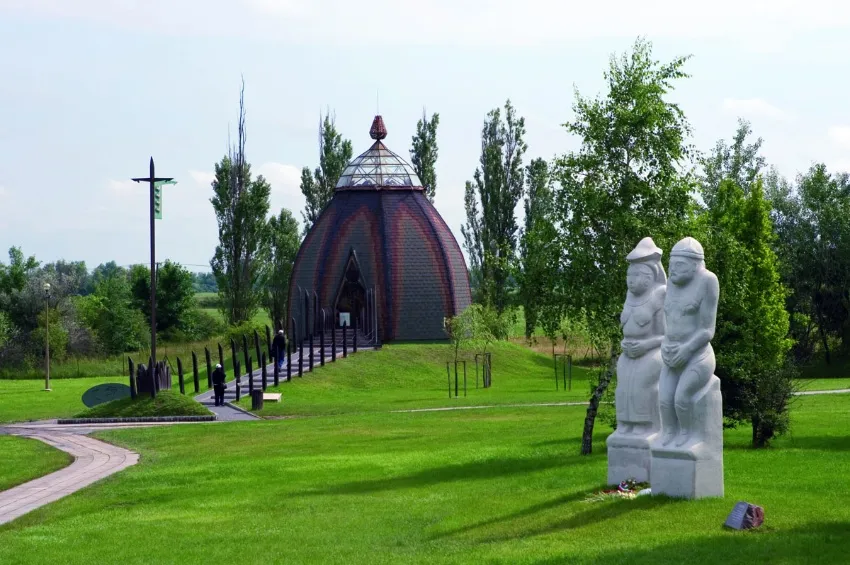
Departure by coach in the company of your guides to Lajosmisze and the Puszta.
Riding aboard a charabanc - a traditional horse-drawn carriage with wooden benches - you'll be amazed by the wonderful landscapes and unusual fauna of the Puszta. In a small part of the Hungarian Steppe, you'll get to observe Racka sheep with their spiral-shaped horns, Mangalica pigs with their curly coats and Hungarian Grey cattle with their long, curved horns, as well as rare species of birds. In the course of your visit, you'll get the chance to attend a traditional horse show while tasting* "palinka" (plum eau-de-vie) and some "pogacsa" (small savory buns) as well as mineral water, sheltered from the sun under a thatched roof. The csikós, the mounted horse-herdsmen of Hungary dressed in traditional blue attire, will invite you to take part in their "games of skill and ability”.
For lunch, you'll be able to taste local specialties served in a "czardas” (a traditional tavern) surrounded by Hungarian musicians.
Afterwards, you'll set out for a visit of Kecskemét on foot. Located in the central part of Hungary, the city shelters various Fine Arts institutes. Several of its buildings have given the city its fame. You'll be able to admire the Cifrapalota - a palace in Rococo style ornate with colorful patterns and flowers - that is today home to the Kecskemét Art Gallery, as well as the impressive City Hall, the former Synagogue that was turned into an office building by the Soviets, and more.
Return on board by coach.
PLEASE NOTE
- Lunch in a typical restaurant is included (drinks are not included).
- Good walking shoes, sunglasses, a cap and a bottle of water are recommended.
- The visit of Kecskemét is on foot.
- *Alcohol can be harmful to your health. Please drink in moderation.
- The order of the visits can change.
- Times are approximate.
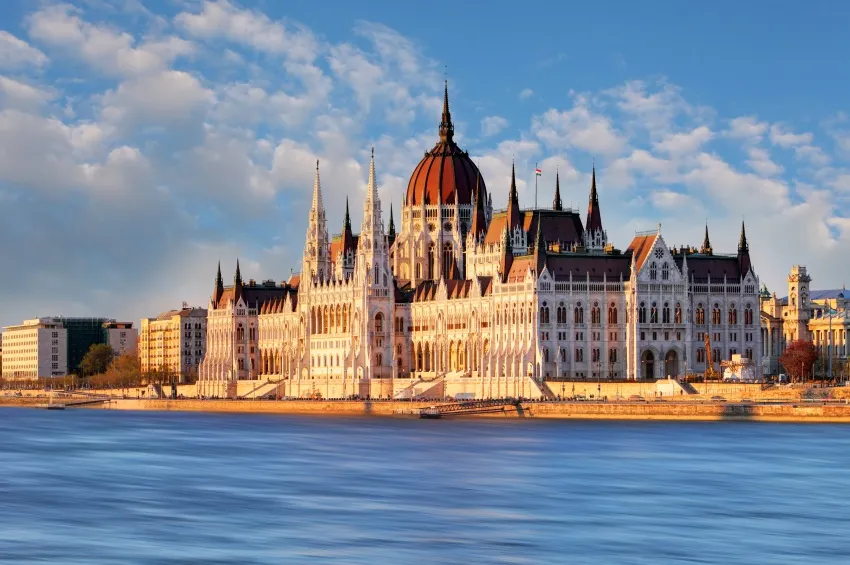
In the company of our guides, we will leave for a panoramic tour of Budapest, the Pearl of the Danube. First we will head for the hills of Buda by crossing the Elizabeth Bridge and we will go up to the Castle quarter, from where we'll enjoy a fantastic panoramic view of the city. We will walk round the castle quarter and on to the Fisherman's Bastion, built in neo-Roman style in 1902 for the simple pleasure of offering a panoramic view over the city and the Danube. Behind the Bastion, we will find Matthias Church which notably was the venue for the coronation of Emperor Franz Joseph and his wife "Sissi". Our coach will then take us down to the plains of Pest. There, we will visit Heroes' Square whose central monument depicting Prince Arpad and the chieftains of seven Magyar tribes was built for the millennium of Hungary. We will pass by the famous Szechenyi thermal baths, the zoo - a true piece of architecture - Vajdahunyad Castle and more. We will walk through the famous Andrassy Avenue and pass by St. Stephen's Basilica whose construction began in 1851 and was only completed in 1905. We will walk along the river and see the famous Parliament building overlooking the Danube with its white silhouette in the Byzantine and neo-Gothic styles. Return on board.
PLEASE NOTE
- Panoramic tour with stops to take pictures.
- Entrance tickets for these monuments are not included.
- The order of the visits can change.
- Times are approximate.
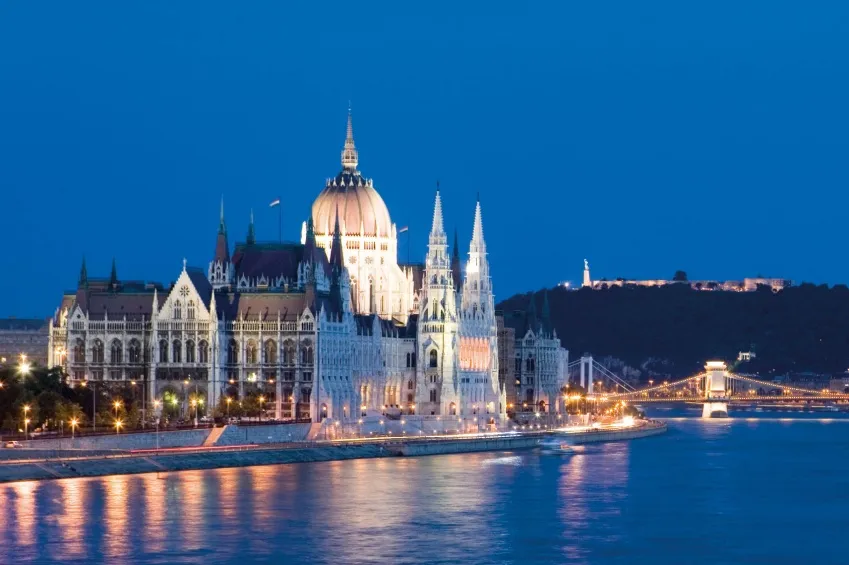
Explore Budapest by night from the comfort of our coach. Your guide will show you the charms of this capital city with its turbulent but incredibly rich past. Despite the vicissitudes of history, Budapest has managed to preserve and bear witness to a succession of dynasties and civilisations. We'll start off towards the citadel for an impressive view over the city and on Pest. We'll then walk up to the citadel and the Liberty Statue from where we'll get to marvel at the most beautiful view of Budapest and the Danube, as well as catch a glimpse of the Parliament building and the famous Chain Bridge. We'll continue by coach towards the Castle Quarter from where you'll get to admire the Royal Palace, former residence of the Hungarian kings. As we drive alongside the banks of Buda, we'll stop off before the Parliament for an occasion to admire and take pictures of the largest building in the country. We'll continue across Margaret Bridge and enjoy a beautiful view of downtown Budapest. Before we go back on board, our coach will drive along the Danube so you can enjoy once again the wonderful view over Buda, the Castle Quarter and the Fishermen's Bastion. Return on board.
PLEASE NOTE
- Visit by coach with stops to take pictures.
- This excursion will not occur on August 20th, Hungarian National Day.
- Good walking shoes are recommended.
- The order of the visits can change.
- Times are approximate.
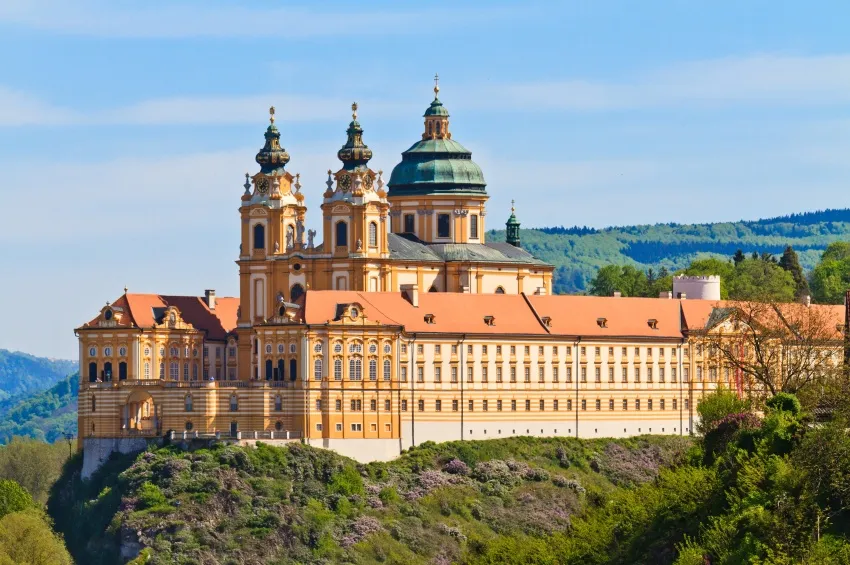
Departure by coach in company of your host/hostess towards Melk Abbey. We will meet up with our guides in the inner courtyard to start our visit. The Abbey overlooking the Danube was first built as the Babenberg's fortified castle. It was founded in the 11th century and the current buildings of the Benedictine abbey date from the Baroque era and were designed by architect Jakob Prandtauer.
Melk Abbey now houses a museum in which you'll discover several rooms that have been enhanced thanks to architecture, sound and light as well as the use of various types of media. Computer animations will tell you a story about the construction of the edifices. You will also visit the marble hall, the world famous library and the bedchambers where a number of illustrious visitors have slept. Return on board by coach.
PLEASE NOTE
- Good walking shoes are recommended: from the parking lot to the entrance of the Abbey there are stairs and a 500m cobblestone path.
- Depending on the cruise the visit can be in the morning or in the afternoon.
- Please dress appropriately.
- Depending on navigation schedules passengers could have free time.
- The order of the visits can change.
- Times are approximate.
- Languages: FR-EN-DE.
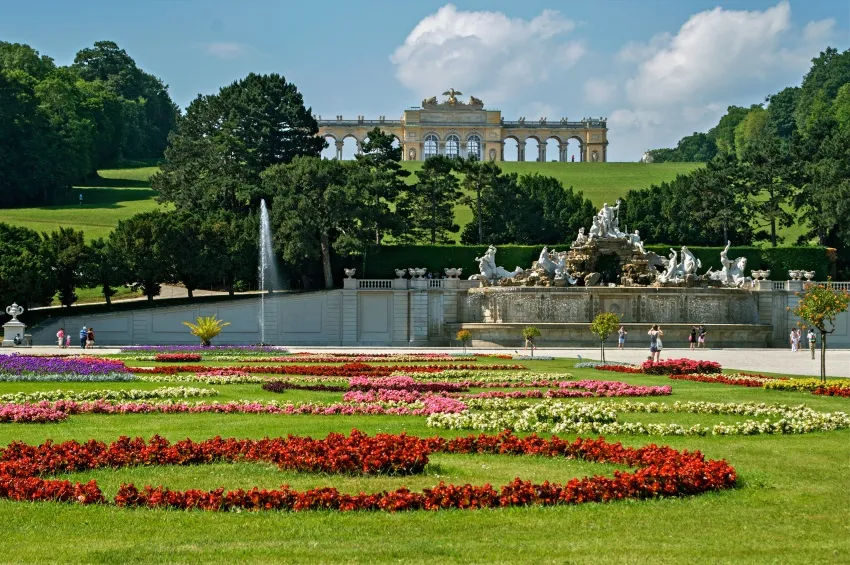
You will begin the tour by taking the famous Ring to reach Schoenbrunn Palace. The "Ring" was one of the personal projects of Emperor Franz Joseph. In 1857, he decided to take down the ramparts that enclosed the city center and had this boulevard built lined with fine buildings. Along the Ring you will admire this architectural showcase of the old Austro-Hungarian monarchy, including: the State Opera; the Hofburg Palace; the Natural History Museum; the City Hall; the Burgtheater and more.
When you arrive at Schoenbrunn Palace, you will be guided through the numerous rooms of the Hapsburgs' summer residence, which bear witness to the splendor of the Court at the time of Maria Theresa. You will also have some time to wander through the Palace gardens.
You will then return to the coach, which will take you to the city center to enjoy some free time in the area around St Stephen's Cathedral. You will then return to the coach, which will take you back to the boat, via the Ring.
PLEASE NOTE
- Comfortable shoes are recommended.
- The order of the visits can change.
- Times are approximate.
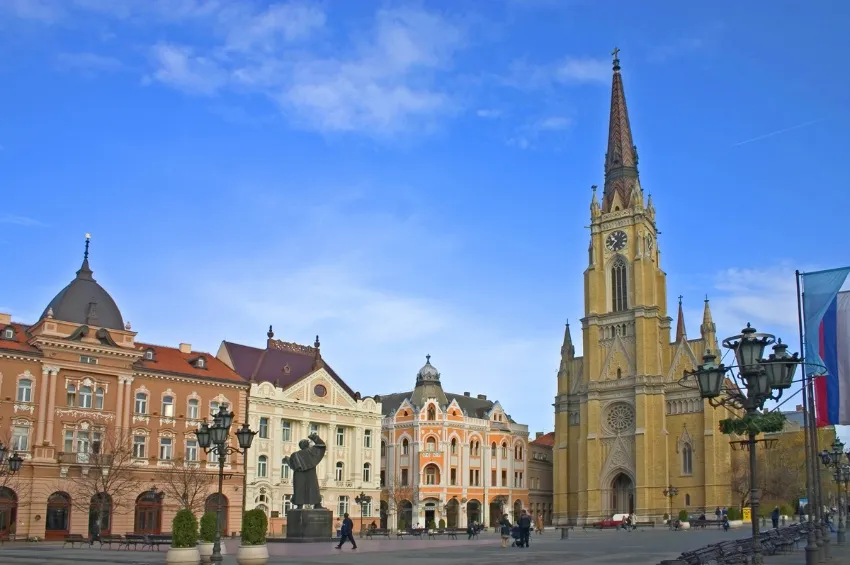
We'll set off by coach to visit the town of Novi Sad. Capital of the autonomous region of Vojvodina, Novi Sad is also the second largest town in Serbia, going by the size of its population. The town has a long and troubled history since it was under the rule of Celts, Romans, Franks, Barbarians and Turks until it became part of the Habsburg empire. It was known as "Petrovaradin” in the past, and the name Novi Sad (meaning ‘new plant') only came into use in 1748. The history of the town was further troubled during the 20th century when after the First World War, the Balkan territories were in turn united and separated under different names, until in 2006 when the town finally became part of an independent Serbia.
We'll visit the city center on foot. The Austro-Hungarian old town, with its baroque buildings, grew up around the ancient fortifications. We'll get the chance to visit the Episcopal Church as well as an orthodox church before we continue up the main street to Freedom Square where we'll find the Town Hall, dating from 1895. The coach will be waiting for you near Freedom square to finish the visit with a panoramic tour up the main boulevards leading to the boat.
Our coach will continue to the little village of Sremski Karlovci where we'll visit the Cathedral of St Nicholas, built in typical baroque style in 1758, and the first ever secondary school of Serbia dating from the end of the 18th century which has a library housing around 18,000 books. We'll take time to admire one of the most well-known of the town's monuments, the Four Lions Fountain, built in 1799 to celebrate the town's first ever waterworks. Return on board in Novi Sad.
PLEASE NOTE
- Good walking shoes are recommended (paths with cobbles and earth in the fortress).
- The order of the visits can change.
- Times are approximate.
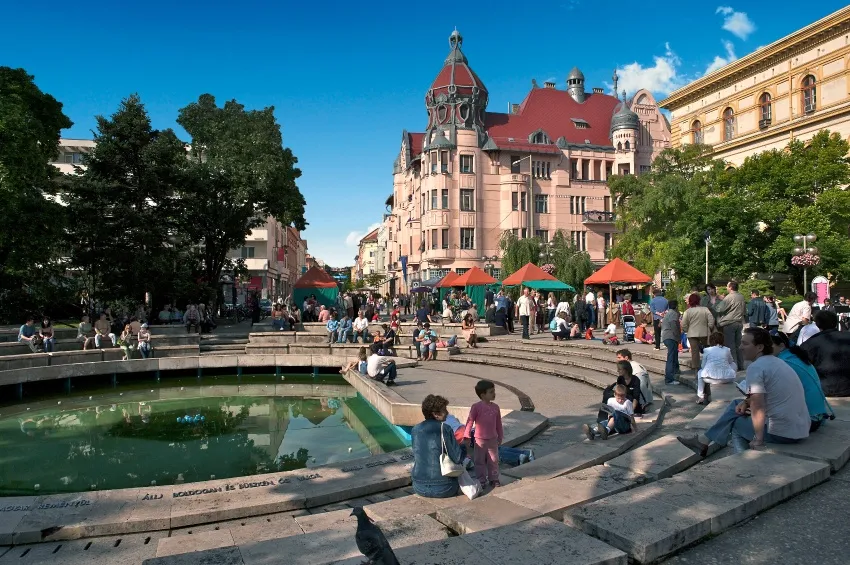
Departure by coach for the guided walking tour of Szeged.
The privileged geographical location of the city explains a human presence going back several thousand years. Szeged was founded by the Romans and was originally called Partiscum.
The results of excavations that were carried out on the site lead us to believe that Attila the Hun had set up a military base there. A river flood in 1879 destroyed the city almost entirely, allowing a new and more beautiful Szeged to emerge.
Our tour will first take us to Szechenyi Square, one of the finest and largest in the city with numerous statues of famous Hungarians. We will see the neo-Baroque City Hall dating from 1799, before heading for the statue-filled pedestrian streets. Our coach will then take us to the Votive Church and Cathedral of Our Lady of Hungary, whose construction was commissioned at the beginning of the 20th century by the city officials following the great floods of 1879 in order to commemorate the rebirth of the city. Next, we will head for the Synagogue which was built at the turn of the 20th century in Moorish Art Nouveau style. Its impressive dimensions make it the largest synagogue in Hungary after the one in Budapest. Our visit ends at the University's musical clock. Return on board by coach or on foot.
PLEASE NOTE
- The visit of the Synagogue will be replaced by a visit to the Orthodox Church on Saturdays, Sabbath day.
- The visit of the Votive Church will be exceptionally replaced by a visit to the Parish Church if a wedding is planned on Saturdays or Sundays during mass.
- Good walking shoes are recommended: the visit will be mostly on foot, the coach will only be used in between the visit of the monuments.
- The order of the visits can change.
- Times are approximate.
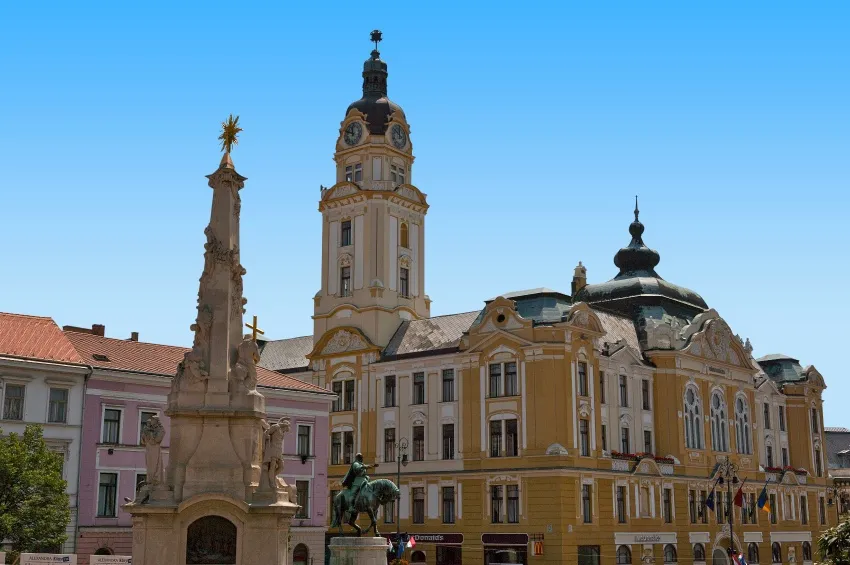
Departure by coach to visit beautiful Pécs in Southern Hungary.
Pecs was first mentioned in old Latin documents as "Quinque Ecclesiae” in relation to the materials from five former Christian chapels that were used to build new churches in the city.
In the company of our guide, we'll set out for a visit of the city on foot, starting with Sts. Peter and Paul's Cathedral or Basilica whose Roman foundations date from the 4th century. The Basilica's current neo-Romanesque facade is the result of the reconstruction carried out between 1882 and 1891, although it has kept its medieval floorplan and post-Romanesque interiors. You will also have the opportunity to see the Basilica's treasure and crypt. The visit continues with the Early Christian Necropolis dating from the 4th-century foundation of the Roman town under the name "Sopianae". These tombs, richly decorated with wall paintings depicting Christian scenes, were built underground as funerary chambers with commemorative chapels above them. It has been listed as a UNESCO World Heritage Site since 2000. Afterwards, our tour continues downtown, stopping at the Djami. In the 13th century, the Turks destroyed St Bartholomew's church and used its stones to build a mosque following the orders of Pasha Gazi Kassim. Pécs was freed from Turkish occupation in 1868 and the mosque became a Catholic church again, although it kept the aspect of a Turkish mosque. Enjoy some free time downtown before returning on board by coach.
PLEASE NOTE
- Visit entirely on foot, good walking shoes are recommended.
- The visit of the necropolis is not recommended for claustrophobic people. There are also stairs to climb.
- The order of the visits can change.
- Times are approximate.
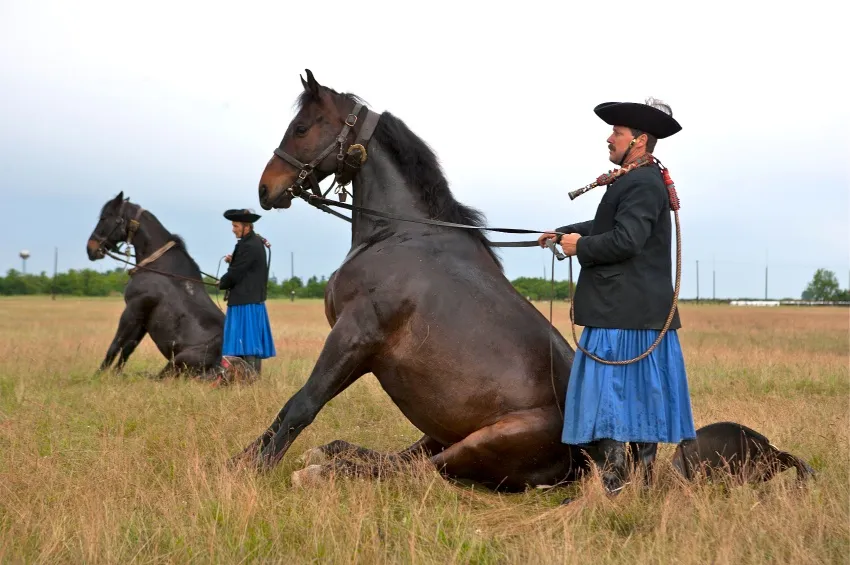
Departure by coach to visit Hortobagy Park. Created in 1973, Hortobagy national park is located on the Great Plain of Hungary: the Puszta. Hortobagy Park is one of Europe's largest expanses of grassland. It is unique and gives all its meaning to the word "Puszta", which means at once desert-like and desolated, as well as a grouping of isolated farms and vast plain. The park covers 70,000 hectares, and has been listed as a World Cultural Heritage site since 1999. It teems with incomparable curiosities and treasures.
Riding aboard a charabanc - a traditional horse-drawn carriage with wooden benches - you'll be amazed by the wonderful landscapes and unusual fauna of the Puszta. In a small part of the Hungarian Steppe, you'll get to observe Racka sheep with their spiral-shaped horns, Mangalica pigs with their curly coats and Hungarian Grey cattle with their long, curved horns, as well as rare species of birds. In the course of your visit, you'll get the chance to attend a traditional equestrian show while tasting* "palinka" (plum eau-de-vie) and some "pogacsa" (small savory buns) as well as mineral water, sheltered from the sun under a thatched roof. The csikós, the mounted horse-herdsmen of Hungary dressed in traditional blue attire, will invite you to take part in their "games of skill and ability”.
After your visit of the park, you will have some free time near the famous Nine Arch Bridge of Hortobagy before returning on board in Tiszafüred.
PLEASE NOTE
- Good walking shoes, sunglasses and caps are recommended.
- The order of the visits can change.
- Times are approximate.
- *Alcohol can be harmful to your health. Please drink in moderation.
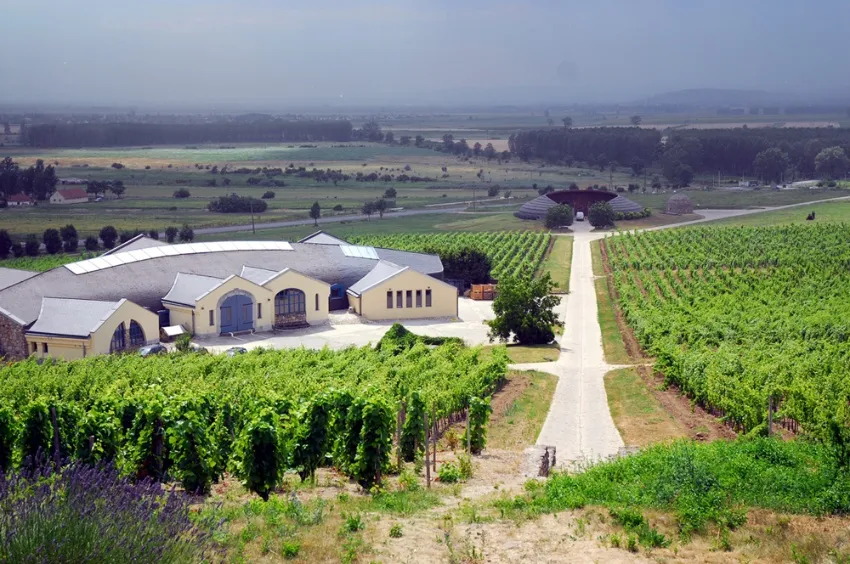
Departure by coach in the company of your guide towards the Tokaj vineyards and the Hetszölö domain, considered to be the most beautiful in all of Tokaj. You'll be greeted by an oenologist who will guide you through its vineyard and tell you about its meaning and history. The tour continues to downtown Tokaj where you'll learn more about the town's history through your guides while walking round the tiny Main Square. Afterwards, you'll enjoy a wine-tasting session in historic Rakoczi cellar. In the course of centuries the cellar, built at the beginning of the 15th century, was owned by kings, sovereigns, princes and generals. The imposing (28 m long, 10 m wide and 5 m high) knights' hall is the largest underground hall of this wine region and this is where the orders elected János Szapolyai the king of Hungary in 1526. There, you will get to taste* 4 Tokaj wines - from the driest to the sweetest - as well as "pogasca” (small savory buns). An oenologist from the cellar will provide commentaries throughout the tasting, telling you all about the traditions and production method for the famous "aszu” wine.
After the tasting, enjoy some free time before returning to the boat at your own pace.
PLEASE NOTE
- Caps, sunglasses and warm clothes for the tasting in the cellar are recommended.
- Good walking shoes are recommended.
- The order of the visits can change.
- Times are approximate.
- *Alcohol can be harmful to your health. Please drink in moderation.
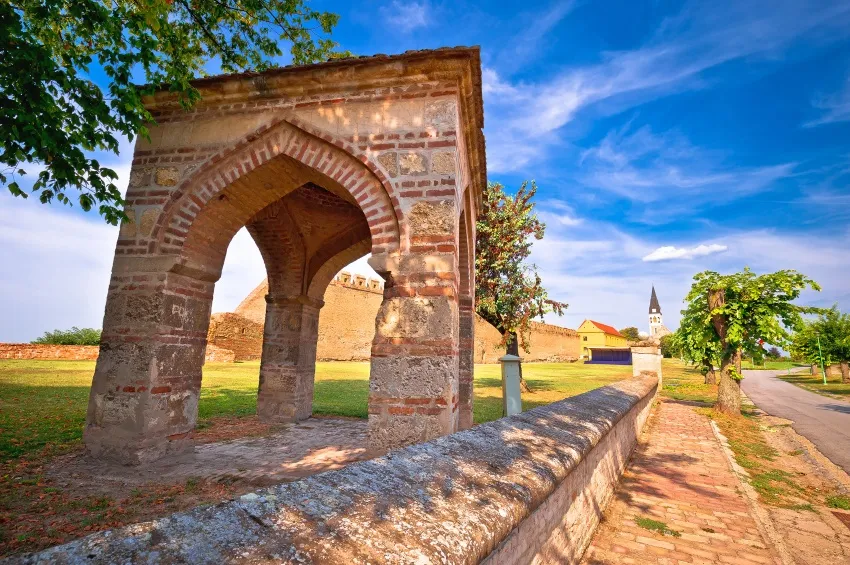
Our excursion starts with a visit to the medieval town of Ilok. Overlooking the Danube, this small fortified town has for centuries over been famous for its vineyards. Tangible proofs of life from prehistorical times and the Middle-Ages up to the present day keep flourishing in the old town. The oldest pieces of evidence date back to the Neolithic Era. You'll get the chance to see many vestiges from the Roman period as well as a wealth of heritage from the Middle-Ages, including the remains of the basilica of Saint Peter dating from the 13th century and the walls of the fortress built by Nikola Ilochki in the 15th century. You'll also be visiting the historical town center, the church and convent of St John of Capistrano which were built in the 14th century by the Duke of Ugrin and the castle of Odescalchi. In the castle, you will find a museum portraying the town's cultural and historical heritage. You'll also enjoy a tasting of some local products.
PLEASE NOTE
- Comfortable shoes are recommended.
- The order of the visits can change.
- Times are approximate.

We'll set off by coach to visit the town of Novi Sad. Capital of the autonomous region of Vojvodina, Novi Sad is also the second largest town in Serbia, going by the size of its population. The town has a long and troubled history since it was under the rule of Celts, Romans, Franks, Barbarians and Turks until it became part of the Habsburg empire. It was known as "Petrovaradin” in the past, and the name Novi Sad (meaning ‘new plant') only came into use in 1748. The history of the town was further troubled during the 20th century when after the First World War, the Balkan territories were in turn united and separated under different names, until in 2006 when the town finally became part of an independent Serbia.
We'll visit the city center on foot. The Austro-Hungarian old town, with its baroque buildings, grew up around the ancient fortifications. We'll get the chance to visit the Episcopal Church as well as an orthodox church before we continue up the main street to Freedom Square where we'll find the Town Hall, dating from 1895. The coach will be waiting for you near Freedom square to finish the visit with a panoramic tour up the main boulevards leading to the boat.
PLEASE NOTE
- Good walking shoes are recommended (paths with cobbles and earth in the fortress).
- The order of the visits can change.
- Times are approximate.
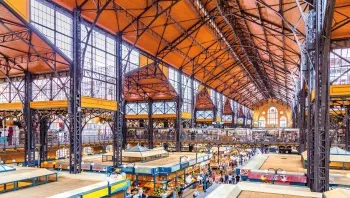
We'll leave on foot for the Budapest Market Halls. The Great Market Hall is the largest and most spectacular of the five market halls built in the 19th century. You can indulge in all types of goods at the more than 180 stands spread out over three stories. One of the market's distinctive features is the colorful Zsolnay tiling on the roof. Some residents will spend hours on public transportation to shop at the Központi Vásárcsarnok. You'll find a wide variety of food, including fruits, vegetables, local cold cuts, and garlands of paprika on the ground floor. The second floor houses restaurants where locals and tourists mingle. The recently renovated basement contains exhibits of high-quality Hungarian products for purchase at the market. At the end of the visit, tasting of traditional Hungarian products. After our tour, we'll return to the ship on foot.
PLEASE NOTE
- Times are approximate.
- The order of the visits can change.
Medieval Golubac Fortress-an impressive cliffside castle overlooking the entrance to the Iron Gates-fell into disarray in the 20th century. It underwent restoration from 2005 to 2016 and is now open to the public. Golubac has three main sections guarded by nine towers-all connected by thick stone walls. The fortress has passed through the hands of the Hungarians, Bulgarians, and Serbs repeatedly. On a side note, the site was a runner-up choice as a shooting location for Game of Thrones.
PLEASE NOTE
- Good walking shoes are recommended.
- Times are approximate.
- The order of the visits can change.
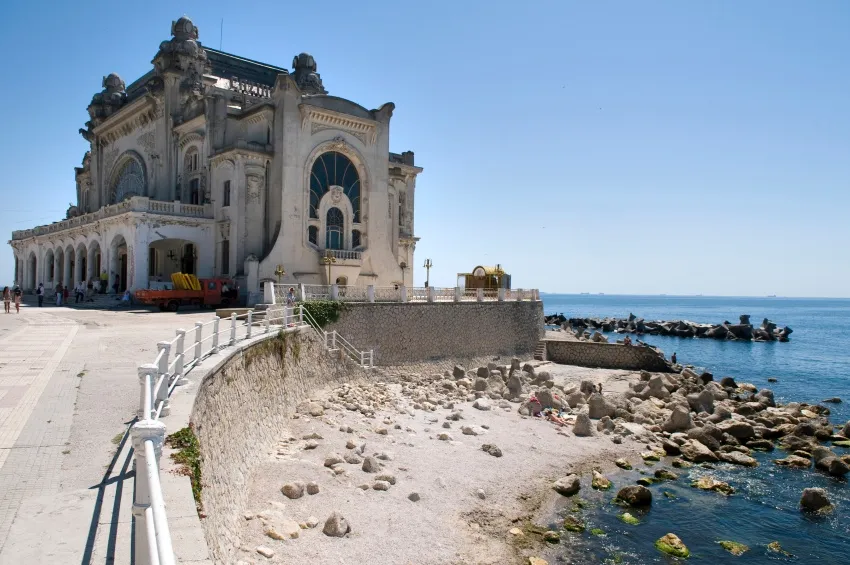
Optional excursion to Constanta. Departure by coach towards the Black Sea to reach Constanta. Founded by the Greeks in the 7th century BC, it now has a population of over 560,000 inhabitants and is the second biggest port on the Black Sea after Istanbul. We will leave Ovidius Square to visit the Museum of History and Archaeology, which brings together items found during archaeological excavations. Across from there, a glass museum houses the vast Roman mosaic, a beautiful polychrome mosaic dating from the 3rd century. Then we will discover an architectural melting pot including the Roman mosque (outsides only) and the Orthodox Church (interior) as well as the Genoese Lighthouse. Don't miss the beautiful view over Old Constanta from the pier. We'll walk along the waterfront all the way to the majestic Casino (outsides only), built in the early 20th century in Austrian Art Nouveau style. It reminds us of Constanta in its heyday, when it used to be the favorite holiday destination of the idle rich. Moving on towards Murfatlar, which produces the best wines in Romania. This winery over 4000ha is the largest in Europe. There will be a wine tasting session in a cellar. Return on board in Cernavoda / Fetesti.
PLEASE NOTE
- Comfortable walking shoes are recommended.
- The order of the visits can change.
- Times are approximate.
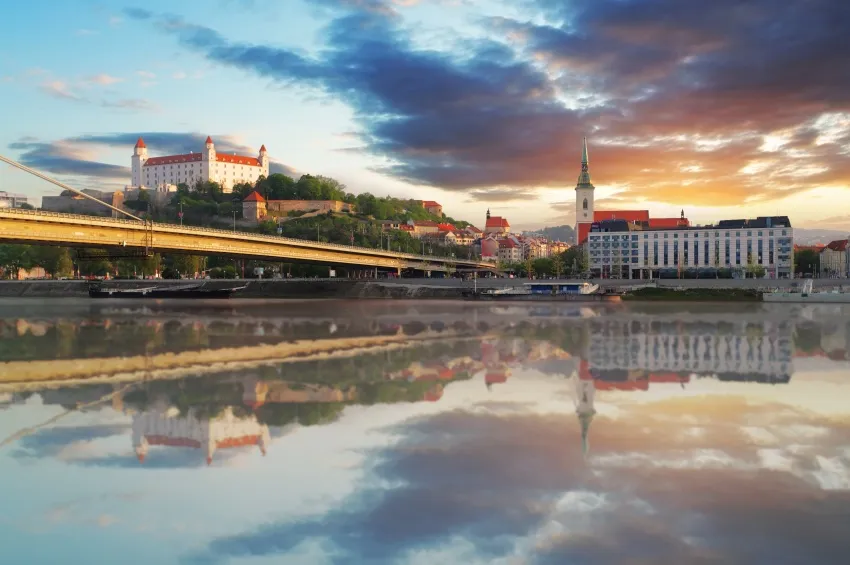
Bratislava, before becoming the capital of independent Slovakia in 1993, was first of all the capital of Hungary from 1536 to 1784 under the name of Presburg. It then belonged to Czechoslovakia before becoming the capital of the "Slovak Socialist Republic" as part of Czechoslovakia between 1969 and 1992.
With your guides, you will begin the visit with a panoramic tour of the city which will take you to Bratislava Castle, which dates from 1811, after the previous castle burned down, and from where you will enjoy a breathtaking view over the Danube and the city. The main historical monuments are in the Old Town and the coach will drop you off at the entrance to the Old Town to continue the visit on foot. You will enter the city through Michael's Gate, which is the only gate still surviving from the Middle Ages. Then you will head for the central square surrounded by elegant buildings, some in Art Nouveau style, and dominated by the old Bratislava Town Hall. The tour will continue with the Primate's Palace completed in 1781 for Archbishop Jozef Bathyány.
As you stroll through the streets, you may come across some of the amusing statues that are dotted around the capital.
In the programs MVI/MVI_PP/NVI/NVI_PP : After the guided tour, you will have some free time to enjoy the Christmas market located in the Main Square in front of the City Hall. We will return to the boat on foot or by coach depending on sailing times.
PLEASE NOTE
- The order of the visits can change.
- Times are approximate.
- Good walking shoes are recommended.
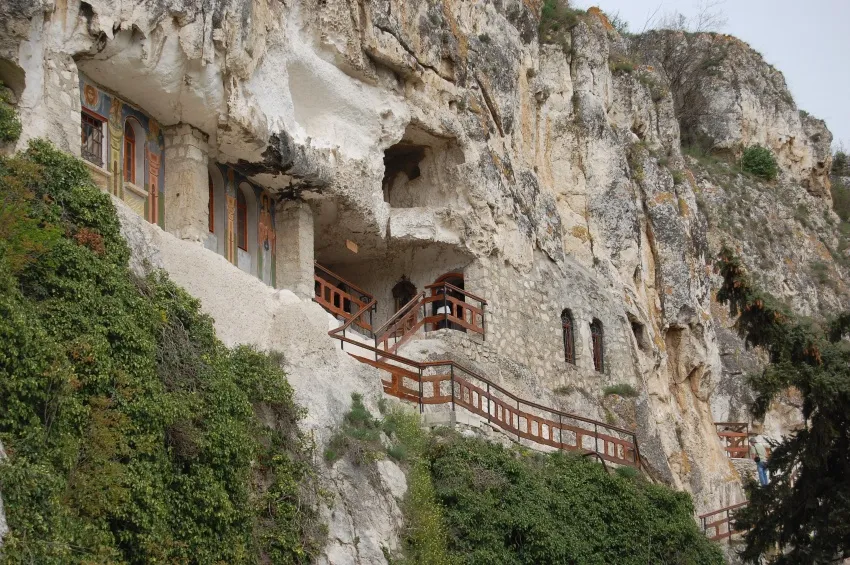
We'll set off by coach in the company of our guides to the Valley of Roussenki-Lom for a visit to a rock-hewn church of Ivanovo, listed by UNESCO as a World Heritage Site. Here in this valley in North-Eastern Bulgaria, several churches, chapels, monasteries and cells were discovered close to the village of Ivanovo. The first hermits dug their cells and their churches out of the bedrock to a height of over 50m as early as the 12th century. The 14th-century murals testify to the exceptional skill of the artists belonging to the Tarnovo School of painting. We'll visit the The Church of the Holy Virgin, one of the most interesting churches dating from the 12th century with 14th-century paintings which bear witness to an exceptional artistic technique.
Our excursion continues with a visit to the Medieval Fortified Town of Cherven, from where you'll be able to enjoy magnificent panoramic views. Built in the 6th century by Byzantines, the fortress was one of the most important in Bulgaria from the 12th century onwards. Return on board by coach.
PLEASE NOTE
- Good walking shoes are recommended: there are many steps to climb to access the fortress in Tcherven. Access to the Church of the Holy Virgin is via a mountain path.
- Photos in the church of the Holy Virgin should be paid for to the guardian of the church. (1 to 2€ as a gesture).
- The order of the visits can change.
- Times are approximate.
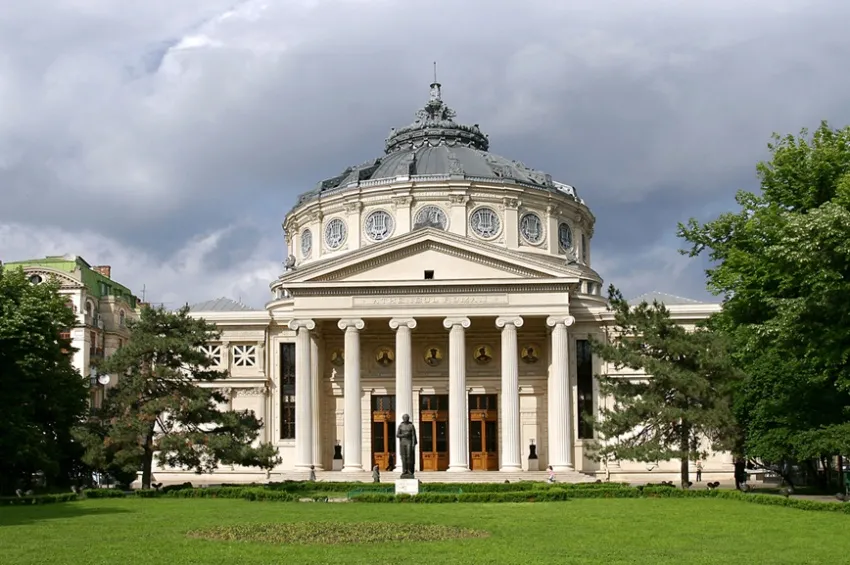
We'll leave on our full day excursion in the company of our guides to discover the Romanian capital of Bucharest. According to legend, the city was founded by a shepherd called Bucur, which means ‘joy' in Romanian. Bucharest has suffered greatly from its communist past but after the year 2000, due to the advent of significant economic growth, the city has modernized.
We'll start off our visit with a panoramic tour of the city giving you an overview of the various monuments of the capital. We'll head to the restaurant for a typical Romanian lunch with traditional music and folklore dancing to entertain us. After lunch, we'll head again by coach to Bucharest's Eco-museum*, a genuine village in the city where we'll learn about the habitats of the different regions of Romania and their handcrafts. We'll conclude our visit with a photo stop at the Palace of Parliament, a gigantic neo-classical style marble construction designed by Ceausescu before visiting the Orthodox Church.
We'll leave Bucharest by coach and head back to the ship.
PLEASE NOTE
- The ship continues cruising during this on-shore excursion.
- Lunch is included.
- The visit lasts all day - comfortable shoes are recommended.
- The order of the visits can change.
- Times are approximate.
- *The Eco-museum is closed on Mondays and replaced by a visit to the Cernica Monastery.

We'll set off by coach to visit Belgrade, the capital of Serbia, which is also one of the oldest cities in Europe with a history stretching back some 7000 years. It is located at the confluence of the Sava and Danube Rivers, close to the Morava Corridor which links the countries of the Danube to the Aegean Sea. The town has a fortress sitting atop one of the highest hills in Belgrade as well as a commercial center and port. We'll start off our visit with a guided panoramic tour of the city, during which you will have the opportunity to admire Belgrade's National Theatre and National Museum, the Royal Palace which currently houses the City Assembly of Belgrade, the Ancient Royal Palace and more. We'll stop to visit the Orthodox Temple of St Sava. The construction of this church began in 1939 but is still a work in progress, given that the Second World War followed by Tito's dictatorship put a halt to it. Construction only started again in 2001 and is funded exclusively by charitable donations. We'll head back to the city center by coach for some free time before our guides take us to Kalemegdan Park, the largest and most beautiful park in the city where the Belgrade Fortress is located, overlooking the confluence of the Danube and Sava. Return to the ship by coach.
PLEASE NOTE
- Good walking shoes are recommended.
- Times are approximate.
- The order of the visits can change.
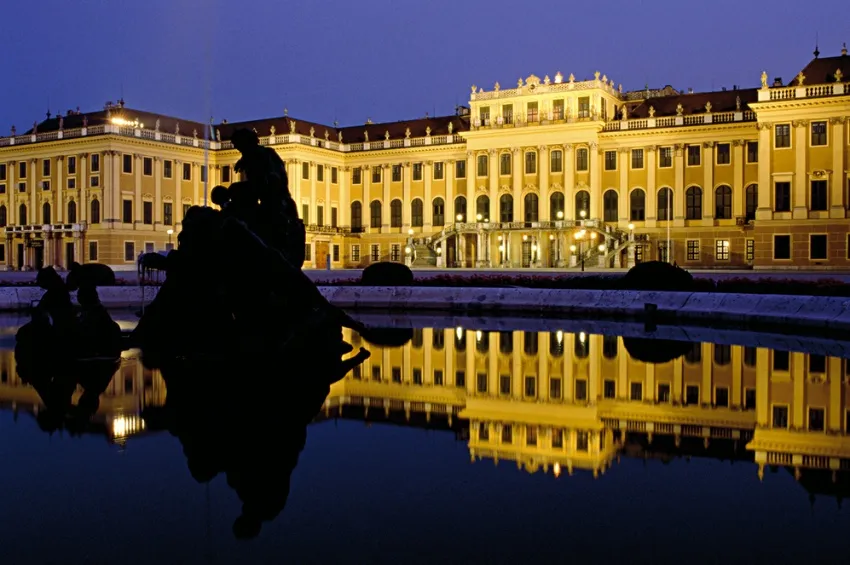
Discover Vienna by night with a panoramic coach tour. This two-thousand-year-old city is a true open-air museum. Vienna embodies Romanticism through its powerful architecture and numerous monuments. We'll take the famous Ring which encircles historic Vienna, on the right bank of the Danube. Our coach will go past a multitude of buildings that were erected under the old Austro-Hungarian monarchy: the Opera, the City Hall, the Hofburg and many official buildings. We will stop at Schwarzenbergplatz with a monument in honor of Johann Strauss. Then, a walk around Albertina quarter will allow us to admire Hofburg Palace, the winter residence of the Habsburgs which today houses the Sisi Museum, as well as the Augustinian Church where Franz Joseph and Sisi's wedding was conducted. Return to the boat by coach.
PLEASE NOTE
- Panoramic tour with walking stops : Albertina quarter ~ 40min and Schwarzenbergplatz ~ 20min.
- Comfortable shoes are recommended.
- The order of the visits can change.
- Times are approximate.
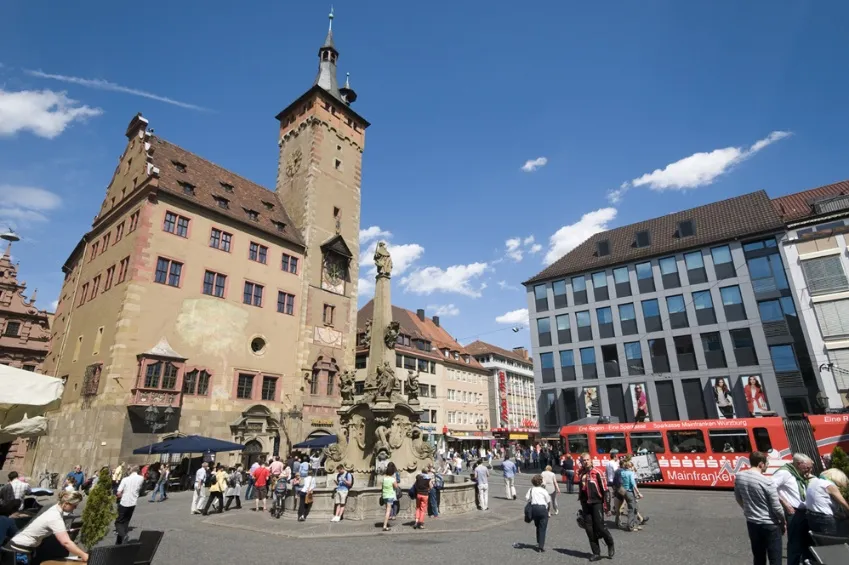
Departure by coach in the company of your hostess to the center of Würzburg.
Our tour will start with a visit to the Würzburg Residence (or Residenz), former palace of the Prince-Bishops of Würzburg. Construction was commissioned by Prince-Bishop Friedrich Carl von Schönborn as a replacement for the old Marienberg Fortress and lasted between 1720 and 1780. You'll discover 40 rooms richly decorated with furniture, paintings and tapestries by 18th century master artists and climb up the monumental Main Staircase designed by Balthasar Neumann. Among others, you will visit the Baroque Imperial Hall whose frescoes were the works of Italian painter Giovanni Battista Tiepolo, and the Imperial Apartments richly decorated in Rococo style.
Our tour will continue downtown where you will have some free time before returning on board by coach.
PLEASE NOTE
- Comfortable shoes are recommended: the streets are cobbled in the city center.
- The order of the visits can change.
- Times are approximate.
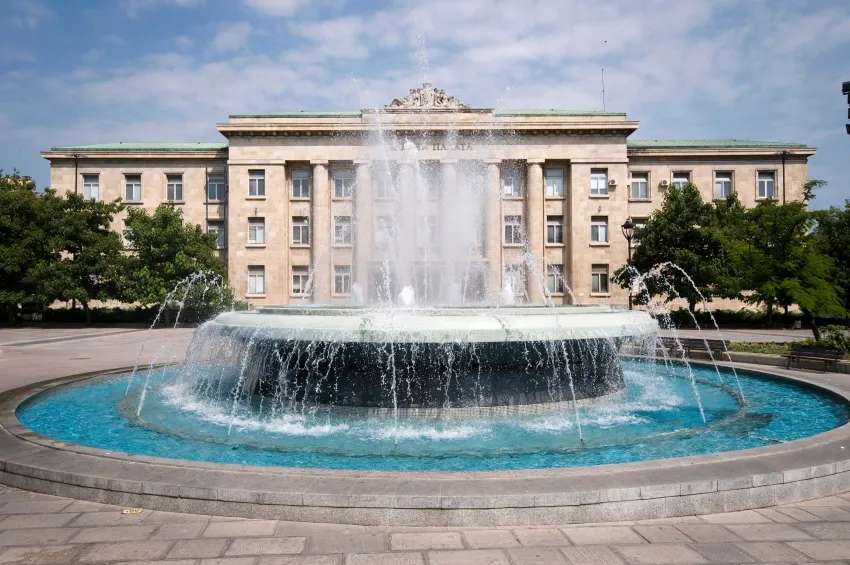
We'll set off by coach to visit the town of Ruse, one of the largest ports in Bulgaria. It was founded by the Romans under the orders of Emperor Augustus. During the Ottoman Empire, it was the most important town of the empire located on the Danube.
In the company of our guide, we'll discover the fascinating architectural heritage of the town, a rich mixture of Bulgarian and Romanian cultures. We'll get the chance to admire the Dohodno Zdanie (the Old Theatre), built in 1902 by architects Raul Brank, Georg Lang and Frank Scholz; the Monument of Liberty, a masterpiece by Florentine architect and sculptor Arnoldo Zocchi; the Catholic Church with its multi-colored stained-glass windows and so on. We'll end our visit with a tasting of a local pastry and wine. We'll have some free time to go shopping before our coaches take us back to the ship.
PLEASE NOTE
- Good walking shoes are recommended.
- The order of the visits can change.
- Times are approximate.
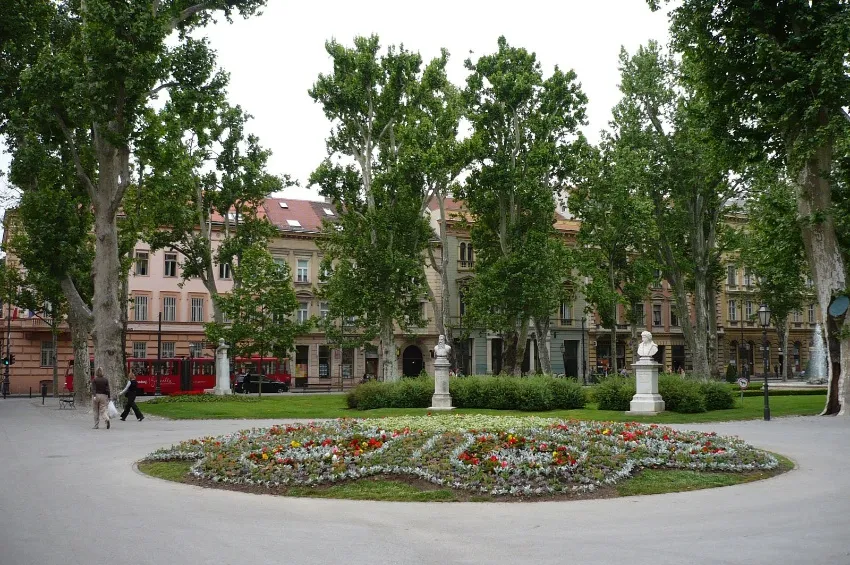
Departure by coach from Sisak in the company of your hostess towards Zagreb.
The Croatian capital was born from the junction of two medieval towns which for centuries developed on two hills facing each other. These two cities, Gradec and Kaptol, were surrounded by walls and towers, some vestiges of which have survived. In the 17th and 18th centuries, the two towns merged and were renamed Zagreb. The city was then renovated in Baroque style. The old timber houses were destroyed and replaced with luxurious palaces, churches and convents.
Your panoramic tour will take you past the Croatian National Theater, the Art Pavilion, the Academy of Sciences and Arts, the Secession style university library and more. Then, you'll be able to take a stroll down the steep streets of the historic center.
Lunch will be taken in a restaurant in the city for a chance to try local specialties.
PLEASE NOTE
- Lunch is included (without drinks).
- Comfortable shoes are recommended.
- The order of the visits can change.
- Times are approximate.

Departure by coach from Belgrade or Novi Sad. Our excursion begins with a visit to Krusedol Monastery located in the mountainous region of Fruska Gora. More than 16 Orthodox monasteries are spread around the hamlet of Irski Venac, a great opportunity to soak up Serbian art combining Byzantine and Baroque architecture. You will be delighted by the magnificent paintings from the 18th century that adorn this beautiful 16th century monastery.
Our coach will then take us to Novi Sad. Capital of the autonomous region of Vojvodina, Novi Sad is also the second largest town in Serbia, going by the size of its population. The town has a long and troubled history since it was under the rule of Celts, Romans, Franks, Barbarians and Turks until it became part of the Habsburg Empire. It was known as "Petrovaradin” in the past, and the name Novi Sad (meaning ‘new plant') only came into use in 1748. The history of the town was further troubled during the 20th century when after the First World War, the Balkan territories were in turn united and separated under different names, until in 2006 when the town finally became part of an independent Serbia. We'll visit the city center by foot. The old Austro-Hungarian city with its Baroque buildings developed around ancient fortifications. You will be able to see the Episcopal Church as well as the Orthodox Church before continuing up the main street to Freedom square with the old Town Hall, dating from 1895. The coach will be waiting for you near Freedom square to finish the visit with a panoramic tour up the main boulevards leading to the boat.
PLEASE NOTE
- Good walking shoes are recommended.
- Appropriate clothing required for the visit to the monastery (no shorts or T-shirts, covered shoulders for women and closed shoes).
- The order of the visits can change.
- Times are approximate.

We'll set off by coach to visit the town of Novi Sad. Capital of the autonomous region of Vojvodina, Novi Sad is also the second largest town in Serbia, going by the size of its population. The town has a long and troubled history since it was under the rule of Celts, Romans, Franks, Barbarians and Turks until it became part of the Habsburg empire. It was known as "Petrovaradin” in the past, and the name Novi Sad (meaning ‘new plant') only came into use in 1748. The history of the town was further troubled during the 20th century when after the First World War, the Balkan territories were in turn united and separated under different names, until in 2006 when the town finally became part of an independent Serbia.
We'll visit the city center on foot. The Austro-Hungarian old town, with its baroque buildings, grew up around the ancient fortifications. We'll get the chance to visit the Episcopal Church as well as an orthodox church before we continue up the main street to Freedom Square where we'll find the Town Hall, dating from 1895. The coach will be waiting for you near Freedom square to finish the visit with a panoramic tour up the main boulevards leading to the boat.
Our coach will continue to the little village of Sremski Karlovci where we'll visit the Cathedral of St Nicholas, built in typical baroque style in 1758, and the first ever secondary school of Serbia dating from the end of the 18th century which has a library housing around 18,000 books. We'll take time to admire one of the most well-known of the town's monuments, the Four Lions Fountain, built in 1799 to celebrate the town's first ever waterworks. Return on board in Novi Sad.
PLEASE NOTE
- Good walking shoes are recommended (cobbled and dirt roads in the fortress).
- The order of the visits can change.
- Times are approximate.

Optional day trip to Constanta. Departure by coach towards the Black Sea to reach Constanta. Founded by the Greeks in the 7th century BC, it now has a population of over 560,000 inhabitants and is the second biggest port on the Black Sea after Istanbul. We will leave Ovidius Square to visit the Museum of History and Archaeology, which brings together items found during archaeological excavations. Across from there, a glass museum houses the vast Roman mosaic, a beautiful polychrome mosaic dating from the 3rd century. Then we will discover an architectural melting pot including the Roman mosque (outsides only) and the Orthodox Church (interior) as well as the Genoese Lighthouse. Don't miss the beautiful view over Old Constanta from the pier. We'll walk along the waterfront all the way to the majestic Casino (outsides only), built in the early 20th century in Austrian Art Nouveau style. It reminds us of Constanta in its heyday, when it used to be the favorite holiday destination of the idle rich. We'll then have lunch at a local restaurant before moving on towards Murfatlar, which produces the best wines in Romania. This winery over 4000ha is the largest in Europe. There will be a wine tasting session in a cellar. Return on board in Cernavoda / Fetesti.
PLEASE NOTE
- Comfortable walking shoes are recommended.
- Lunch included.
- The order of the visits can change.
- Times are approximate.
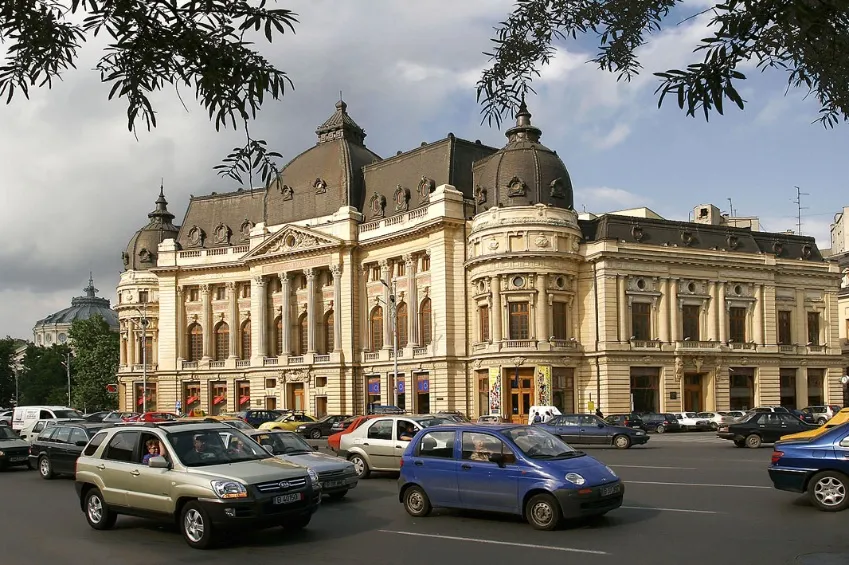
Departure by coach from Giurgiu with your guides to discover the Romanian capital of Bucharest. According to legend, the city was founded by a shepherd named Bucur (which means joy in Romanian). Bucharest has suffered greatly from its communist past but after the year 2000, due to the advent of significant economic growth, the city has modernized. You will start the visit with a panoramic tour of the city giving you an overview of the various monuments of the capital. You will take the coach to the Bucharest Eco-museum*, an authentic village in the city where you will discover the habitats of the different regions of Romania and their handcrafts. The visit will end with a photo stop at The Palace of Parliament, a gigantic neo-classical style marble construction designed by Ceausescu and then you will visit the Orthodox Church. You will leave the city by coach to reach the boat.
PLEASE NOTE
- Comfortable shoes are recommended.
- The order of the visits can change.
- Times are approximate.
- *The Eco-museum is closed on Mondays and replaced by a visit to the Cernica Monastery.
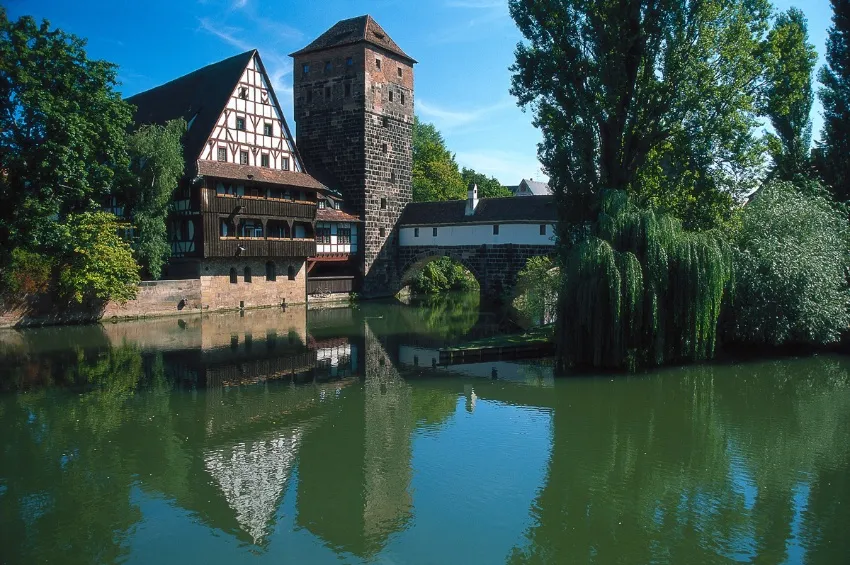
Join us for a guided tour of Nuremberg by coach. We'll enjoy a panoramic visit of the monuments found outside of the city's medieval walls, including the Nuremberg Palace of Justice, the Nazi Documentation Centre and Party Rally Grounds, the castle area, etc. You'll discover the charming side streets and beautiful half-timbered houses before arriving in the Marktplatz. On foot, you'll see the gorgeous Schöner Brunnen (beautiful fountain) and the Frauenkirche. During our tour, we'll stop and taste one of the local specialties, Lebkuchen, the city's famous gingerbread.
PLEASE NOTE
- Good walking shoes are recommended.
- The order of the visits can change.
- Times are approximate.
